Home » Blog » Dissertation » Topics » Law » Media law » 80 Media law Research Topics


80 Media law Research Topics
FacebookXEmailWhatsAppRedditPinterestLinkedInIn the ever-evolving landscape of modern media, the intersection of law and communication has become a dynamic field ripe for exploration and scholarship. For undergraduate, master’s, and doctoral students alike, embarking on a research journey into media law topics offers an exciting opportunity to delve deep into the intricacies of this multifaceted discipline. As you […]

In the ever-evolving landscape of modern media, the intersection of law and communication has become a dynamic field ripe for exploration and scholarship. For undergraduate, master’s, and doctoral students alike, embarking on a research journey into media law topics offers an exciting opportunity to delve deep into the intricacies of this multifaceted discipline. As you embark on your quest for the perfect research topics, let’s navigate the vast sea of possibilities that media law presents, catering to the unique requirements of each academic level. Whether you’re aiming to embark on your undergraduate thesis, master’s dissertation, or doctoral research, we’ve got you covered with a diverse range of captivating research topics that will captivate your intellectual curiosity and leave a lasting impact on this ever-evolving field.
Media Law, also known as “communication law,” “entertainment law,” and “mass media regulations.”, refers to the body of legal principles and regulations governing various aspects of mass media, including print, broadcast, digital, and entertainment industries.
A List Of Potential Research Topics In Media Law:
- Assessing the effectiveness of media law in protecting the intellectual property of creators.
- Investigating the impact of media law on the protection of cultural heritage in digital media.
- Examining the implications of COVID-19 on the legal protection of journalists and media workers.
- A systematic review of the effectiveness of media law in protecting journalistic sources.
- Examining the legal framework for regulating deepfakes in political campaigns.
- Examining the impact of the pandemic on media ownership and consolidation.
- An examination of the evolving role of media law in the protection of data privacy.
- Analyzing the legal responsibilities of UK-based social media platforms in content moderation.
- Analyzing the role of media law in addressing content removal and algorithmic bias.
- Investigating the impact of media law on access to information during public health crises.
- Assessing the impact of media law on the protection of whistleblowers in corporate settings.
- Analyzing the role of media law in addressing online harassment of marginalized communities.
- Analyzing the impact of fake news on media credibility and legal responses.
- Assessing the effectiveness of media law in addressing deep-seated systemic biases in journalism.
- Assessing the legal challenges of remote journalism and virtual reporting during lockdowns.
- A comprehensive review of media ownership concentration and its implications for democracy.
- Examining the implications of media law on the protection of indigenous knowledge.
- The intersection of media law and sustainable finance : navigating ethical advertising and ESG reporting in the media industry.
- Examining the legal implications of deep-linking and framing in online media.
- An analysis of media law’s role in protecting the intellectual property of content creators.
- Investigating the role of media law in addressing issues of media bias.
- Evaluating the effectiveness of right-to-be-forgotten laws in media contexts.
- Analyzing the legal challenges of media convergence and cross-ownership.
- Assessing the legal framework for regulating political advertising in the UK post-Brexit.
- Investigating the role of media law in regulating virtual influencers and AI personalities.
- Examining the implications of media law on access to government information.
- Investigating the role of media law in addressing hate speech against religious groups.
- A comprehensive review of the legal challenges of copyright infringement in online media.
- Assessing the effectiveness of media law in safeguarding data privacy in contact tracing efforts.
- Assessing the legal framework for protecting journalists in conflict zones.
- A review of the legal implications of social media platform algorithms on content distribution.
- Analyzing the role of media law in addressing the surge of online hate speech during the pandemic.
- Analyzing the role of media law in addressing misinformation and public health communication.
- Examining the legal framework for regulating podcasting and audio streaming.
- A comprehensive review of media law’s role in preserving press freedom in authoritarian regimes.
- A comprehensive review of the role of media law in addressing hate speech and extremism.
- A critical review of the legal challenges of content moderation on online platforms.
- A critical review of the effectiveness of right-to-be-forgotten laws in media contexts.
- Investigating the role of media law in addressing privacy concerns in British tabloid journalism.
- Media law and immigration: balancing freedom of speech and protecting immigrant rights in the digital age.
- Assessing the impact of the UK’s Online Safety Bill on media freedom and expression.
- Examining the legal challenges of AI-generated music and art in media.
- Examining the implications of media law on the protection of LGBTQ+ rights.
- Assessing the impact of media law on protecting historical archives and records.
- Investigating the legal challenges of copyright infringement in online media.
- Assessing the role of media regulation in preserving journalistic integrity.
- Analyzing the legal responsibilities of social media influencers in promoting products.
- A comparative review of media regulation frameworks in different countries.
- Exploring the legal implications of AI-generated news articles.
- An in-depth review of the legal responsibilities of influencers in sponsored content.
- Investigating the legal responsibilities of social media platforms in content removal.
- Assessing the effectiveness of media law in combatting disinformation campaigns.
- Examining the legal challenges of defamation cases involving British celebrities.
- Examining the legal responsibilities of influencers in sponsored content.
- Analyzing the impact of pandemic-related restrictions on media freedom and access to information.
- A systematic review of the impact of media law on cultural diversity and representation in media.
- A critical review of the legal responses to online harassment and cyberbullying.
- Assessing the impact of media law on the protection of journalistic sources.
- Investigating the legal challenges of content moderation on online platforms.
- An examination of media law responses to the spread of disinformation campaigns.
- A review of media law responses to emerging technologies like virtual reality and AI-generated content.
- Analyzing the legal challenges of the UK’s implementation of the EU Copyright Directive.
- Analyzing the legal challenges of deepfake technology in media content.
- Assessing the effectiveness of the UK’s data protection laws in the context of media companies.
- Examining the intersection of media law and data privacy in the era of big data.
- Investigating the impact of social media on defamation laws in the digital age.
- Analyzing the legal implications of targeted advertising and data profiling in media.
- Investigating the legal responsibilities of media platforms in preserving evidence of crimes.
- Assessing the impact of media law on press freedom in authoritarian regimes.
- Assessing the legal framework for regulating live streaming and user-generated content.
- Assessing the role of media law in shaping public perception of government responses to COVID-19.
- Assessing the legal framework for regulating political advertising in digital media.
- A critical review of the legal framework for regulating political advertising in digital media.
- Investigating the role of media law in addressing hate speech and extremism in the UK.
- Analyzing the legal implications of media coverage of high-profile trials.
- Investigating the role of media law in regulating virtual reality and augmented reality content.
- Investigating the legal framework for regulating pandemic-related infodemics in the media.
- Analyzing the impact of media ownership concentration on freedom of the press.
- An in-depth review of the legal challenges deepfake technology poses in media content.
- Examining the legal challenges of copyright infringement in the gaming industry.
In media law, the possibilities for research are as boundless as the digital frontier itself. Whether you’re exploring issues related to freedom of speech, privacy, intellectual property, or the ever-expanding realm of digital media, there’s a research topic waiting for you at every degree level. So, as you embark on your academic journey, remember that media law research topics are not just subjects of study; they are gateways to understanding the complex interplay between media and the law, shaping the essence of our information society. Dive in, explore, and discover the fascinating world of media law research topics that await your scholarly pursuit.
Order Media Law Dissertation Now!
External Links:
- Download Media Law Dissertation Sample For Your Perusal
Research Topic Help Service
Get unique research topics exactly as per your requirements. We will send you a mini proposal on the chosen topic which includes;
- Research Statement
- Research Questions
- Key Literature Highlights
- Proposed Methodology
- View a Sample of Service
Ensure Your Good Grades With Our Writing Help
- Talk to the assigned writer before payment
- Get topic if you don't have one
- Multiple draft submissions to have supervisor's feedback
- Free revisions
- Complete privacy
- Plagiarism Free work
- Guaranteed 2:1 (With help of your supervisor's feedback)
- 2 Installments plan
- Special discounts
Other Posts
- 80 Administrative Law Research Topics August 30, 2023 -->
- 80 Agricultural Law Research Topics August 30, 2023 -->
- 80 Alternative Dispute Resolution (ADR) Research Topics August 30, 2023 -->
- 80 Antitrust and Competition Law Research Topics August 31, 2023 -->
- 80 Arbitration Dispute Resolution Law Research Topics September 3, 2023 -->
- 80 Banking Law Research Topics August 31, 2023 -->
- 80 Business Law Research Topics August 31, 2023 -->
- 80 Civil Rights Law Research Topics August 31, 2023 -->
- 80 Commercial Law Research Topics August 31, 2023 -->
- 80 Comparative Law Research Topics August 31, 2023 -->
- 80 Constitutional Law Research Topics September 1, 2023 -->
- 80 Consumer Law Research Topics September 1, 2023 -->
- 80 Contract Law Research Topics September 1, 2023 -->
- 80 Corporate Law Research Topics August 17, 2023 -->
- 80 Criminal Law Research Topics September 1, 2023 -->
- 80 Cyber Law Research Topics September 1, 2023 -->
- 80 Employment Law Research Topics September 1, 2023 -->
- 80 Energy Law Research Topics August 17, 2023 -->
- 80 Environmental Law Research Topics September 1, 2023 -->
- 80 Estate Planning and Probate Law Research Topics September 1, 2023 -->
- 80 Family Law Research Topics September 2, 2023 -->
- 80 Health Law Research Topics September 2, 2023 -->
- 80 Human Rights Law Research Topics September 3, 2023 -->
- 80 Immigration Law Research Topics September 3, 2023 -->
- 80 Insurance Law Research Topics September 3, 2023 -->
- 80 Intellectual Property Law Research Topics September 3, 2023 -->
- 80 International Business Law Research Topics September 3, 2023 -->
- 80 International Commercial Law Research Topics August 17, 2023 -->
- 80 International Criminal Law Research Topics September 3, 2023 -->
- 80 International Investment Law Research Topics September 4, 2023 -->
WhatsApp us
Digital Media Law Project
Founded in 2007 as the "Citizen Media Law Project," the Digital Media Law Project (DMLP) works to ensure that individuals and organizations involved in online journalism and digital media have access to the legal resources, education, tools, and representation that they need to thrive. The DMLP carries out its mission through five core initiatives: (1) its detailed Legal Guide on media and business law topics for non-lawyers; (2) its searchable Database of Legal Threats directed at online publishers; (3) its nationwide attorney referral service, the Online Media Legal Network; (4) its Research & Response initiative to address breaking issues and trends in digital media law; and (5) its regularly-updated Blog and Newsletter on current issues in media law, technology law and journalism Legal Guide : The DMLP publishes a comprehensive legal guide for individuals and organizations involved in independent online publishing and journalism. The guide covers topics ranging from how to form a business to how to use freedom of information and open meetings laws to get access to information, meetings, and governmental records, as well as other legal subjects such as risks associated with online publication, including discussion of defamation and privacy torts; legal issues related to newsgathering; use of copyrighted and trademarked materials; and special risks associated with covering elections. The Legal Guide now runs to more than 600 pages and covers the fifteen most populous U.S. states and the District of Columbia. Users of the guide can search by keyword , browse by state , or simply browse by section . The guide is broken into six major sections: Forming a Business and Getting Online ; Dealing with Online Legal Risks ; Newsgathering and Privacy ; Access to Government Information ; Intellectual Property ; and Risks Associated with Publication . The DMLP selects the topics covered by the Legal Guide to address the issues that content creators and publishers routinely encounter in the course of forming and running their ventures. In addition to serving as a reference for individuals seeking help, the Legal Guide is often used by university journalism programs and other publishing organizations as a key resource. Database of Legal Threats : The DMLP publishes a database of more than 900 entries covering lawsuits, subpoenas, and other legal actions involving digital media and online speech. Each entry consists of a plain-language description of the case or threat and links to blog or press coverage. Most entries also contain the underlying documents, including copies of cease-and-desist letters, lawsuit complaints, legal briefs, and court orders. The database is publicly searchable by keyword and by more than 25 distinct data fields, including by state, legal claim, type of publisher, subject area, and date of filing. Users of the database can also do full-text searching of the pleadings and motions associated with each database entry. If you've been threatened with legal action or know of someone who has, please let us know by using our contact form or by entering the information directly into the database through our easy to use threat entry form . Legal Assistance : The DMLP operates the Online Media Legal Network (OMLN), which is a network of more than 250 law firms, law school clinics, in-house counsel, and individual lawyers throughout the United States willing to provide free and reduced-fee legal assistance to qualifying online journalism ventures and other digital media creators. Since its inception, the DMLP has assisted clients with hundreds of separate matters. Lawyers and clinical law students at Harvard Law School's Cyberlaw Clinic also provide legal advice to individuals and organizations that operate independent media sites. Research and Response : Our central vantage point on issues affecting the journalism industry enables us to detect urgent issues affecting digital journalism as they arise. Our attorney and client networks, together with our tracking of legal threats, serve as an "early warning system" for urgent legal needs affecting the digital journalism community. This permits us to respond with relevant information and legal resources in an informed and timely manner, collaborating with our wide array of partner organizations where appropriate. The Research and Response initiative reflects the flexibility of the DMLP to address these important issues. Rather than responding in a uniform fashion to issues as they arise, we recognize that responses to breaking issues must be tailored to the particular issue at hand. To that end we have created a range of white papers and issue guides, participated in litigation as an amicus curiae, appeared at conferences and speaking events, acted in an advisory capacity to various groups, and addressed the media on issues of current interest. DMLP Publishing : The DMLP blog includes content from DMLP staff as well as a diverse group of lawyers, law professors, law students, and others with an interest in new media. Blog posts provide commentary and insight on current events in media law and digital publishing, promote resources and events of interest to digital publishers, and announce new initiatives by the DMLP and its partner organizations. The DMLP blog is a popular destination for site visitors, with individual posts routinely obtaining hundreds or thousands of reads. The Digital Media Law Brief , our monthly newsletter, keeps our followers up to date with our recent activities, our upcoming events, and news items of interest in the fields of media law, journalism, and technology. If you want to find out what the DMLP is doing and what it is going to do next, the newsletter is the best place to go. The DMLP also maintains an active social media presence, with accounts on Twitter at @DMLPBerkman and @omln , and a page on Facebook .
This project is supported in part by the Open Society Institute, the John S. and James L. Knight Foundation, and the Philip L. Graham Fund.
Our Work 70
New report from the dmlp: who gets a press pass media credentialing practices in the united states.
The Digital Media Law Project at Harvard University’s Berkman Center for Internet & Society and the Journalist’s Resource project at Harvard’s Shorenstein Center on Media,…
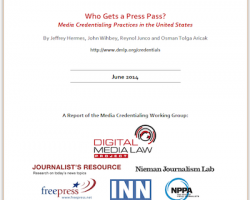
Who Gets a Press Pass?
Media Credentialing Practices in the United States
This study, the first of its kind to perform a quantitative examination of media credentialing in the United States, surveys the experience of journalists throughout the country…
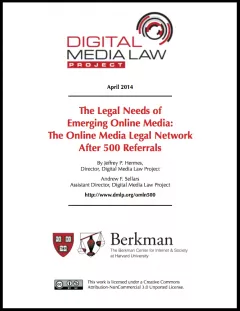
Service and Research at the Frontier of Media Law
New Report from the Digital Media Law Project
Earlier today the Digital Media Law Project released a new report, The Legal Needs of Emerging Online Media: The Online Media Legal Network after 500 Referrals. This report…
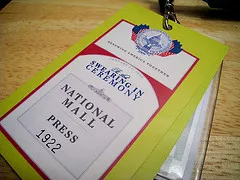
Digital Media Law Project Announces a New Survey of Media Credentialing Practices
The Digital Media Law Project at Harvard University’s Berkman Center for Internet & Society, together with the Investigative News Network, the National Press Photographers…

DMLP files brief seeking First Amendment scrutiny in United States v. Auernheimer
Yesterday the Digital Media Law Project, with help from the Cyberlaw Clinic, filed an amicus brief in the United States Court of Appeals for the Third Circuit in United States v…

Filling the News Gap in Cambridge and Beyond: Citizen Journalism and Grassroots Media
The event will explore the quickly expanding world of citizen journalism: how technology is fueling its growth; how that growth is changing the way we see our world, enact change,…
The DMLP Asks the Sixth Circuit to Safeguard Crowdsourced Research and Data-based Journalism
The Digital Media Law Project (formerly the Citizen Media Law Project), assisted by Harvard Law School’s Cyberlaw Clinic, has asked the Sixth Circuit to make clear that website…

The Citizen Media Law Project is now the Digital Media Law Project
We are pleased to announce that the Citizen Media Law Project has now transitioned to its new name, the Digital Media Law Project.
Announcing a Guide to Reporting at the 2012 Republican and Democratic National Conventions
This guide is intended to be a resource for journalists that will be covering the events surrounding the Republican and Democratic National Conventions (“RNC” and “DNC”)…
DMLP Guide to the IRS Decision-Making Process under Section 501(c)(3) for Journalism and Publishing Non-Profit Organizations
The Digital Media Law Project (DMLP), hosted at Harvard University’s Berkman Center for Internet & Society, is pleased to announce the publication of its Guide to the Internal…
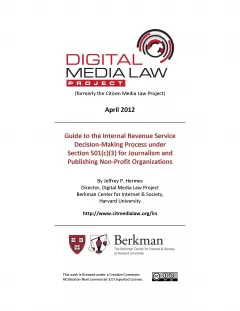
Guide to the IRS Decision-Making Process under Section 501(c)(3) for Journalism and Publishing Non-Profit Organizations
Until and unless there is action in Congress to facilitate tax exemptions for journalism non-profits, news organizations seeking 501(c)(3) status must learn how to structure their…
DMLP Advocates Protection for Uses of Trademarks in Critical Speech Online Before Massachusetts Appeals Court
The Digital Media Law Project (DMLP), assisted by Harvard Law School’s Cyberlaw Clinic, last week asked the Massachusetts Appeals Court to reject a claim of trademark infringement…

Media Law in the Digital Age: The Rules Have Changed -- Again
Co-produced by the Citizen Media Law Project at Harvard's Berkman Center for Internet & Society and Kennesaw State's Center for Sustainable Journalism, Media Law in the Digital…

Law School for Digital Journalists
A Pre-Conference of the Online News Association's 2011 Conference
The Online News Association, Harvard’s Berkman Center for Internet & Society, and the UNC Center for Media Law and Policy present Law School for Digital Journalists, part of the…
Berkman Buzz: July 1, 2011
Measuring the impact of journalism, reviewing Google+, who to trust online, and more...in this week's Buzz.
CMLP Urges First Circuit to Safeguard First Amendment Rights in Case Involving Cellphone Camera Recording of Police Officers
The Citizen Media Law Project submitted an amicus curiae brief to the United States Court of Appeals for the First Circuit in a case involving a lawyer who was arrested for using…
Berkman Center’s Online Media Legal Network Partners with Investigative News Network
The Online Media Legal Network announced that it is collaborating with the Investigative News Network to help INN member organizations find pro bono and low-cost legal help.
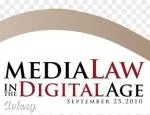
Media Law in the Digital Age: The Rules Have Changed, Have You?
We're pleased to announce that the Citizen Media Law Project at Harvard's Berkman Center and the Center for Sustainable Journalism at Kennesaw State University are co-hosting a…
Citizen Media Law Project & Center for Sustainable Journalism Conference on Media Law in the Digital Age
We're pleased to announce that the Citizen Media Law Project and the Center for Sustainable Journalism at Kennesaw State University are co‐hosting a conference on September 25,…
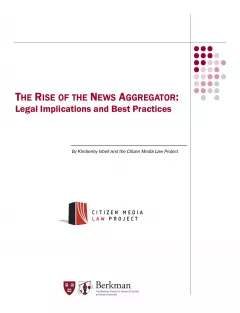
The Rise of the News Aggregator: Legal Implications and Best Practices
This white paper attempts to answer the question of whether news aggregators violate current law by examining the hot news misappropriation and copyright infringement claims that…
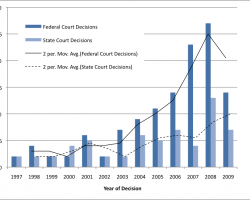
Getting empirical with Section 230 case law
Tired of discussing intermediary liability? Neither are we. Fellow David Ardia's study of all CDA section 230 cases to date is now available in the Loyola of Los Angeles Law…
Berkman Center’s Citizen Media Law Project and Cyberlaw Clinic Advocate First Amendment Scrutiny in Hot News Cases
The Citizen Media Law Project, with the Electronic Frontier Foundation and Public Citizen, submitted an amicus curiae brief to the U.S. Court of Appeals for the Second Circuit,…
New Hampshire Supreme Court Upholds Free Speech Rights for Online News Sites
Ruling Mirrors Arguments Made in Brief by the Citizen Media Law Project, Harvard Cyberlaw Clinic, and Reporters Committee for Freedom of the Press
The NH Supreme Court today issued an important decision upholding the First Amendment rights of online publishers...the Court concluded that a lower court’s injunction preventing…

Symposium: Journalism's Digital Transition: Unique Legal Challenges and Opportunities
The Berkman Center's Citizen Media Law Project and Cyberlaw Clinic are pleased to announce a one-day symposium and CLE program to celebrate the launch of the Online Media Legal…
CMLP and Cyberlaw Clinic Call On Illinois Supreme Court to Preserve Broad Purpose of Citizen Participation Act
The Citizen Media Law Project, joined by the Public Participation Project, the Online News Association, and the Chicago Current, submitted an amicus curiae brief to the Illinois…
OMLN Partners with National Freedom of Information Coalition to Assist with Freedom of Information Lawsuits
The Berkman Center’s Online Media Legal Network (OMLN) announced today that it is partnering with the National Freedom of Information Coalition to assist with freedom of…
OMLN Partners with Online News Association To Provide Legal Assistance to Independent Journalists
The Online Media Legal Network announced that it is partnering with the Online News Association, the premier association for professional digital journalists. The partnership will…
Citizen Media Law Project Publishes New Guide to FTC Disclosure Requirements for Product Endorsements
As part of their legal guide series on Risks Associated with Publication, today CMLP published a guide to Publishing Product or Service Endorsements.
Citizen Media Law Project Launches Legal Assistance Network for Online Journalists
The Berkman Center’s Citizen Media Law Project (CMLP) announced today the public launch of its Online Media Legal Network (OMLN), a new pro bono initiative that connects lawyers…
It's Election Time Again: CMLP Announces Updated Guide to Newsgathering at the Polls
From the Citizen Media Law Project blog: Voters head to the polls again on November 3 to cast their ballots in mayoral, city council, and even a handful of gubernatorial elections…
CMLP and Cyberlaw Clinic Endorse Anti-SLAPP Protection for Staff of Media and Advocacy Organizations
On Thursday, the Citizen Media Law Project (CMLP) joined the American Civil Liberties Union of Massachusetts and the Lawyers’ Committee for Civil Rights Under Law of the Boston…
Radio Berkman 130: Adventures in Anonymity, Part One
This week on Radio Berkman: Dan Jones discusses the ins and outs of a growing number of legal cases involving anonymous online speech with Sam Bayard, assistant director of the…
Citizen Media Law Project: more on newsgathering and privacy
The Citizen Media Law Project (CMLP) has released a new video about newsgathering and privacy issues that citizen reporters might face as they gather documents, take photographs…
CMLP and Cyberlaw Clinic Amicus Brief in the News
In an editorial published earlier this week, the Nashua Telegraph highlighted an amicus brief filed last month by Berkman’s Citizen Media Law Project (CMLP) with the assistance…
Citizen Media Law Project partners with YouTube to help launch Reporters' Center
From the CMLP blog: "As part of today's launch of YouTube's Reporters' Center, which features how-to videos on news reporting, the Citizen Media Law Project created a short video…
Citizen Media Law Project and Cyberlaw Clinic Urge NH Supreme Court to Defend First Amendment Rights of Mortgage Site
The Citizen Media Law Project (CMLP), assisted by Harvard Law School’s Cyberlaw Clinic, urged the New Hampshire Supreme Court to defend the First Amendment rights of a website…
CMLP: Craigslist Dropping 'Erotic Services' Section
David Ardia, director of the Citizen Media Law Project (CMLP), unpacks the issues around Craigslist's decision to replace its "Erotic Services" category...
Radio Berkman: Journalism Is Dead. Long Live Journalism!
This week on Radio Berkman: Dan Gillmor offers his vision for a participatory media, with five principles for 21st century journalism...
Citizen Media Law Project and Cyberlaw Clinic Lead Amicus Effort Promoting Rights of Anonymous Online Speakers in IL
In a case involving important First Amendment rights, the Citizen Media Law Project joined a number of media and advocacy organizations in asking an Illinois appellate court to…
Debating CDA 230
An exchange between John Palfrey and Adam Thierer concerning tweaking Section 230 of the Communications Decency Act was published today in Ars Technica...
New positions with the CMLP
The Citizen Media Law Project is looking for law student interns for the spring and summer and for a new staff attorney.
CMLP: "Virginia Blogger Targeted With Outrageous Subpoena"
Last week CMLP reported on an overreaching subpoena served against Charlottesville, Virgina blogger Waldo Jaquith...
CMLP: Documenting the 2009 Presidential Inauguration
The Citizen Media Law Project has released a must-read for anyone planning a trip to DC on January 20 to witness and record history...
US presidential campaign & election '08
We've assembled a sampling of recent Internet and politics-related activities and writings from the Berkman community...

Video your vote
November 4 at ground level
YouTube and PBS have teamed up to ask US voters to document their voting experiences. You're invited to upload your election day video to the Video Your Vote channel. The Citizen…
The CMLP on choosing an ISP
From the Citizen Media Law Project blog... There are a lot of things to consider when making the decision to launch a blog or website...one area most people tend to overlook is…
Defending the Rights of Artists
Citizen Media Law Project joins The Right to Write Fund in protecting creative artists from legal threats
In the wake of the Harry Potter Lexicon trial, the Berkman Center's Citizen Media Law Project has announced a new partnership with the Right to Write Fund, which helped defend…
Judge Rejects Fair Use Defense in Harry Potter Lexicon Case
The Citizen Media Law Project begins unpacking the 68-page decision in Rowling v. RDR Books, in which Judge Robert Patterson held that RDR "had failed to establish an affirmative…
Cape Cod blogger sued for libel
The Citizen Media Law Project provides detailed analysis of the case of Peter Robbins, of the Robbins Report blog, which raises "a host of interesting questions" concerning…
California Court Warns Copyright Bullies Not to Ignore Fair Use
From the Citizen Media Law Project blog... A federal district court in California held on Wednesday that copyright owners must consider fair use before sending DMCA takedown…
The Citizen Media Law Project on Understanding Your Legal Risks When You Blog or Publish Online
From the Citizen Media Law Project blog...Over the next few weeks I'll be posting about various topics we cover in the CMLP's Citizen Media Legal Guide...Today, I'll start with…
Citizen Media Law Project Legal Guide: final sections now live
From the Citizen Media Law Project blog... Today, we are launching the final sections of the Citizen Media Law Project's online guide to media law covering the risks associated…
Citizen Media Law Project Completes Launch of Online Guide to Media Law
The Citizen Media Law Project (CMLP) announced today that it has completed the launch of its Citizen Media Legal Guide. The free guide, which is intended for use by bloggers,…
Using audio clip for criticism is fair use
District Court spanks Michael Savage suit
From the Citizen Media Law Project blog... In a huge victory for freedom of speech, on Friday a federal district court in California dismissed conservative talk show host Michael…

Iranian parliament moving toward death penalty for blogging on certain topics
From the Citizen Media Law Project... Online free speech has never been well received by the Iranian government, but now Tehran is just one step away from making blogging on…
Judge Sanctions Lawyer for Issuing Subpoena to Blogger Kathleen Seidel
David Ardia of the Citizen Media Law Project updates us on the Sykes v. Seidel case.
AP's Fair Use Challenge
David Ardia of the Citizen Media Law Project hits all the points in his blogpost, "Associated Press Sends DMCA Takedown to Drudge Retort, Backpedals, and Now Seeks to Define Fair…
Prince, Bootlegging, and Copyright Protection for Live Performances
Citizen Media Law Project assistant director Sam Bayard follows up on the "Prince/Radiohead/YouTube flap," raising some additional questions and asking, "Copyright geeks and fair…

Citizen Media Law Project @ 1
David Ardia, Sam Bayard, Tuna Chatterjee
David Ardia, Sam Bayard, and Tuna Chatterjee of CMLP discussed trends in online publishing and previewed the CMLP database of subpeonas, cease-and-desist letters, and other…
CMLP Launches New Legal Guide Section: Intellectual Property
The first cut of the Citizen Media Law Project's in-depth Legal Guide is nearly complete! Last Friday's release of the section on "intellectual property" fills in an essential…
English Libel Law's Pernicious Impact on First Amendment Speech
Citizen Media Law Project director David Ardia walks us through Floyd Abrams' op-ed in today's Wall Street Journal...
How Trademark Law Casts A Dark Cloud Over Free Speech
The Citizen Media Law Project is preparing the intellectual property sections of its legal guide. An article by Professor Bill McGeveran provides some grist for the mill, raising…
The Citizen Media Law Project follows the Quash of the Seidel Subpoena
From the CMLP blog...A federal magistrate judge in New Hampshire has quashed the subpoena issued to Kathleen Seidel. Seidel publishes the blog Neurodiversity, where she writes…
Citizen Media Law Project following new Wikileaks case
From the CMLP blog... Wikileaks, which purports to provide an "uncensorable Wikipedia for untraceable mass document leaking and analysis," is back in the news as it faces a new…
CMLP Launches New Legal Guide Section: Access to Government Information
The Citizen Media Law Project's in-depth Legal Guide continues to grow! Yesterday's release of the section on "access to government information" significantly expands this already…

iBrattleboro Victorious!
The Citizen Media Law Project and Media Re:public hail community news and information site iBrattleboro.com's "significant victory," "a wonderful outcome," in a libel lawsuit…
It's Sunshine Week!
From the Citizen Media Law Project... It’s March and it’s Sunshine Week. This year, from March 16 - 22, the
Berkman Center’s Citizen Media Law Project and Cyberlaw Clinic Challenge Injunctions Against Wikileaks and Dynadot
CAMBRIDGE, MA. – The Berkman Center for Internet & Society’s Citizen Media Law Project (CMLP) and Cyberlaw Clinic have joined a coalition of media and public interest…

Making Sense of the Wikileaks Fiasco: Prior Restraints in the Internet Age
Citizen Media Law Project Director David Ardia is quoted in today's New York Times, saying that a judge's order to shutdown the WikiLeaks website by removing its DNS record, “is…
Citizen Media Law Project Launches Online Legal Guide
The Citizen Media Law Project (CMLP) launched the first sections of its Citizen Media Legal Guide (http://www.citmedialaw.org/legal-guide) last week. The guide, intended for use…
Phil Malone

David Ardia

Dan Gillmor

Wendy Seltzer
Jeffrey hermes.

Andy Sellars
MLRC is a non-profit membership association for members of the media and their defense lawyers. We provide a wide range of resources on media law and policy issues.

- Tuesday, May 14
- San Francisco, CA
Legal Frontiers in Digital Media 2024
The Media Law Resource Center and the Berkeley Center for Law & Technology are proud to present the next in this series of conferences that explore emerging legal issues surrounding digital content in today’s multi-platform world.
New York Times v. Sullivan: The Case for Preserving an Essential Precedent
A comprehensive White Paper heralding Justice Brennan’s opinion, countering the arguments made by its chief critics, and analyzing the role of actual malice in contemporary litigation.
Fair Report 50-State Survey
The Fair Report Survey 50-State is a state-by-state guide to the idiosyncrasies of the fair report privilege.
Log in to access all content
Not a member yet?
Join MLRC today!
We provide you with essential tools to advance First Amendment and media rights, and a supportive community in which to discuss emerging legal issues and the future of communication.
MediaLawLetter April 2024
DC Court Holds Journalist in Contempt for Refusing to Disclose Confidential Sources; Court Quashes Prosecution Subpoena to New Yorker Journalist; The Supreme Court Rules on Social Media Blocking; Entertainment Conference Recap; Ten Questions for Aussie Lawyer Michael Cameron and more.
MediaLawLetter March 2024
Jury Awards $25M in Damages for The Oklahoman’s Misattribution of Racial Slur; Broadcaster Wins Summary Judgment and Fees Under New York’s Expanded Anti-SLAPP; The Supreme Court Hears the NetChoice Cases; Anti-SLAPP Developments in the UK and Europe and What It’s Like Being Slapped in Greece; MLRC’s first conference in Australia and more.
MediaLawLetter January 2024
New York Times Awarded Nearly $400,000 in Trump Suit; Fifth Circuit Affirms That Texas Book Rating System Is Unconstitutional; Fifth Circuit Affirms Preliminary Injunction Against Texas Prosecution of Netflix; The Year in Prior Restraints; and more.
Articles on Media law
Displaying 1 - 20 of 53 articles.

A judgment in Bruce Lehrmann’s defamation trial against Network 10 has been delayed. What’s going on?
Rick Sarre , University of South Australia

‘Fake news’ legislation risks doing more harm than good amid a record number of elections in 2024
Samuel Jens , Stony Brook University (The State University of New York)

Australia’s media classification system is no help to parents and carers. It needs a grounding in evidence
Elizabeth Handsley , Western Sydney University and Fae Heaselgrave , University of South Australia

Russell Brand investigation: what good journalists should have to go through to report sexual assault allegations
Polly Rippon , University of Sheffield

Warhol Foundation v. Goldsmith: Supreme Court rules for income streams over artistic freedom
Hannibal Travis , Florida International University

Why was Bruce Lehrmann given the all-clear to sue media for defamation? A media law expert explains
David Rolph , University of Sydney

Defamation was at the heart of the lawsuit settled by Fox News with Dominion – proving libel in a court would have been no small feat
Nicole Kraft , The Ohio State University

The merger of TVNZ and RNZ needs to build trust in public media – 3 things the law change must get right
Alexander Gillespie , University of Waikato and Claire Breen , University of Waikato

Why was the Brittany Higgins trial delayed, and what is ‘contempt of court’? A legal expert’s view on the Lisa Wilkinson saga

Ending online anonymity won’t make social media less toxic
Shireen Morris , Macquarie University

Nevermind at 30: why the Nirvana baby lawsuit is a warning for parents
Alexandros Antoniou , University of Essex

Why Matt Hancock’s private life is very much in the public interest

How a silent movie informs the current debate over the right to be forgotten
Bill Kovarik , Radford University

Albania’s plan against disinformation lets Facebook and powerful politicians off the hook
Elidor Mehilli , Hunter College

Media Files: Media companies are mad as hell at tech giants and don’t want to take it anymore. But what choice do they have?
Matthew Ricketson , Deakin University and Andrew Dodd , The University of Melbourne

Ghana’s constitution is meant to protect the media: but does it?
Jacob Nyarko , University of Cape Coast


Friday essay: diversity in the media is vital - but Australia has a long way to go
Helen Vatsikopoulos , University of Technology Sydney

Investigating the investigative reporters: Bad news from Down Under
Michael J. Socolow , University of Maine

PODCAST: Pell trial reporters, a judge and a media lawyer on why the suppression order debate is far from over
Andrew Dodd , The University of Melbourne

ACCC wants to curb digital platform power – but enforcement is tricky
Katharine Kemp , UNSW Sydney
Related Topics
- Australian law
- Defamation law
- Fairfax Media
- First Amendment
- Media reform
- Social media
Top contributors
Professor of Law, University of Sydney
Professor of Journalism and Social Media, Griffith Centre for Social and Cultural Research, Griffith University, Griffith University
Professorial Fellow, University of Canberra
University Teacher in Journalism, University of Sheffield
Director of the Centre for Advancing Journalism, The University of Melbourne
Director of Undergraduate Studies, School of Journalism, Media and Cultural Studies, Cardiff University
Co-Director, Centre for Media Transition, University of Technology Sydney
Professor in Media and Communication, Goldsmiths, University of London
Senior Lecturer in Law, The University of Western Australia
Honorary Professor of Media Law, Queen Mary University of London
Senior Research Fellow, Centre for Advancing Journalism, The University of Melbourne
Emeritus Professor of Law and Criminal Justice, University of South Australia
Associate Professor, School of Media, Film and Journalism, Monash University
Lecturer, Media Law, University of Technology Sydney
Senior Lecturer in the School of Culture, History and Language, College of Asia and the Pacific., Australian National University
- X (Twitter)
- Unfollow topic Follow topic
- Technical Support
- Find My Rep
You are here
The SAGE Guide to Key Issues in Mass Media Ethics and Law
- William A. Babcock - Southern Illinois University Carbondale, USA
- William H. Freivogel - Southern Illinois University Carbondale, USA
- Description
The SAGE Guide to Key Issues in Mass Media Ethics and Law is an authoritative and rigorous two-volume, issues-based reference set that surveys varied views on many of the most contentious issues involving mass media ethics and the law. Divided into six thematic sections covering information from contrasting ethical responsibly and legal rights for both speech and press, newsgathering and access, and privacy to libelous reporting, business considerations, and changing rules with social media and the Internet, the information in this guide is extremely relevant to a variety of audiences. This guide specifically focuses on matters that are likely to be regular front-page headlines concerning topics such as technological threats to privacy, sensationalism in media coverage of high-profile trials, cameras in the courtroom, use of confidential sources, national security concerns and the press, digital duplication and deception, rights of celebrities, plagiarism, and more. Collectively, this guide assesses key contentious issues and legal precedents, noting current ethical and legal trends and likely future directions. Features:
- Six thematic sections consist of approximately a dozen chapters each written by eminent scholars and practitioners active in the field.
- Sections open with a general Introduction by the volume editors and conclude with a wrap-up “Outlook” section to highlight likely future trends.
- Chapters follow a common organizational outline of a brief overview of the issue at hand, historical background and precedent, and presentation of various perspectives (pro, con, mixed) to the issue.
- “See also” cross references guide readers to related chapters and references and further readings guide users to more in-depth resources for follow-up.
This reference guide is an excellent source for the general public, students, and researchers who are interested in expanding their knowledge in mass media and the ethics and law surrounding it.
See what’s new to this edition by selecting the Features tab on this page. Should you need additional information or have questions regarding the HEOA information provided for this title, including what is new to this edition, please email [email protected] . Please include your name, contact information, and the name of the title for which you would like more information. For information on the HEOA, please go to http://ed.gov/policy/highered/leg/hea08/index.html .
For assistance with your order: Please email us at [email protected] or connect with your SAGE representative.
SAGE 2455 Teller Road Thousand Oaks, CA 91320 www.sagepub.com
The SAGE Guide to Key Issues in Mass Media Ethics and Law is an authoritative and rigorous two-volume, issues-based reference set that surveys varied views on many of the most contentious issues involving mass media ethics and the law. Divided into six thematic sections covering information from contrasting ethical responsibly and legal rights for both speech and press, newsgathering and access, and privacy to libelous reporting, business considerations, and changing rules with social media and the Internet, the information in this guide is extremely relevant to a variety of audiences. This guide specifically focuses on matters that are likely to be regular front-page headlines concerning topics such as technological threats to privacy, sensationalism in media coverage of high-profile trials, cameras in the courtroom, use of confidential sources, national security concerns and the press, digital duplication and deception, rights of celebrities, plagiarism, and more. Collectively, this guide assesses key contentious issues and legal precedents, noting current ethical and legal trends and likely future directions. Features:
Select a Purchasing Option

This title is also available on SAGE Knowledge , the ultimate social sciences online library. If your library doesn’t have access, ask your librarian to start a trial .
- Search Search
- University of Baltimore Facebook Page
- University of Baltimore Twitter Page
- University of Baltimore LinkedIn Page
- University of Baltimore Instagram Page
- University of Baltimore YouTube Page
- School of Law
Journal of Media Law and Ethics
In april 2012, the school of law began publishing the journal of media law & ethics (issn1940-9389), an online, peer-reviewed journal exploring current legal issues facing the media including copyright, defamation and reporters' privilege..
Published quarterly, JMLE seeks theoretical and analytical manuscripts that advance the understanding of media law and ethics in society. Submissions may have a legal, historical, or social science orientation, but must focus on media law or ethics.
In the current issue of the Journal of Media Law & Ethics , British lawyer Zia Akhtar takes a hard look at the use of social media by jurors in criminal trials and the accompanying concern that the rights of a defendant may be prejudiced by the practice. The article advocates a legal code that would prohibit juror access to information about a defendant’s previous record.
Mark Grabowski follows with an examination of so-called “mugshot” websites through the lens of the Society of Professional Journalists’ Code of Ethics. The article concludes that, while mugshot sites are not an inherently unethical journalism practice, many news outlets present mugshots utilizing ethically dubious methods that urgently need to be reformed.
The need for clear standards governing the kinds of communication that can be considered unprotected “true threats” is demonstrated by the analysis of Eric Robinson and Morgan Hill in our third article. The authors point out that, when the Supreme Court had the opportunity to clarify the elusive concept, in Elonis v. United States and three subsequent cases, they failed to resolve the ambiguities of the doctrine, notwithstanding the prevalence of abusive language online.
It may surprise many of readers that freedom of information is alive, if not entirely well, in China. Based on a massive quantitative study, Yong Tang suggests that enforcement of freedom of information law in the PRC seems more forceful than many Western observers would expect, although there is scant evidence that the law has led to more accountability and better governance.
Finally, Christopher Terry and associates point out that the national press has been woefully remiss in explaining why the so-called censorship of right-wing and other voices by social media platforms is not an abridgment of First Amendment rights. While all likely readers of this journal understand the concept of “state action” in the First Amendment context, the media has generally left the public clueless.
All theoretical perspectives are welcome. All manuscripts undergo blind peer review. Access to JMLE is available to the public at no charge.
All manuscripts must be original and must not be under consideration at other journals.
Peer Review:
All manuscripts will undergo blind peer review. The normal review period is three months or less.
Submissions:
The ideal length for submitted papers is 20-30 double-spaced pages (6,000 to 8,000 words using 12-point Times Roman or equivalent type), including footnotes, tables, and figures. Longer manuscripts will be considered when space is available.The submission and review process will be electronic; all manuscripts should be prepared using Microsoft Word or converted to that format. Email should be sent to the editor, Eric B. Easton , professor of law.
Manuscript Preparation:
All footnotes should be in Bluebook form. All text must be double-spaced except tables and figures, which must be "camera-ready." Microsoft Word is the required software program for formatting manuscripts. The title page should include the title of the manuscript, names and affiliations of all authors, as well as their addresses, phone numbers, and e-mail addresses. Five key words for referencing the document in electronic databases are also required. Only the title page should contain identifying information. The second page should include the manuscript title and an abstract of 150 to 250 words. All figures and tables must be formatted to 5.5 inches in width and no more than 7.5 inches in height.
Copyright and Production Notes:
All works submitted must be original and must not have been published elsewhere. Authors of works that are selected for publication shall retain the copyright in their works. However, authors should give the Journal of Media Law & Ethics and the University of Baltimore School of Law a nonexclusive right to publish the work in journals, books, or any other collections that it may publish at the same time or in the future. Authors shall be given credit in such works and will continue to control the copyright in their own works. After a manuscript is accepted for publication, the author or authors are expected to proofread and edit the page proofs when they are provided.
Permissions:
Authors are responsible for obtaining permission from copyright owners to use lengthy quotations (450 words or more) or to reprint or adapt a table or figure that has been published elsewhere. Authors should write to the original copyright holder requesting nonexclusive permission to reproduce the material in this journal and in future publications of the University of Baltimore School of Law.
Email an electronic copy of manuscripts to: Eric Easton, Editor .
Schools and Colleges
- Yale Gordon College of Arts and Sciences
- College of Public Affairs
- Merrick School of Business
- Robert L. Bogomolny Library
- Law Library
Quick Links
- Academic Calendar
- Academic Support
- Accreditation
- Basic Needs
- Building Hours
- Consumer Information
- Course Schedule
- Covid-19 Info
- Institutional Effectiveness
- Jobs at UBalt
- Mission and Strategic Plan
- MPX Quick Facts
- Policy Guide
- Privacy Statement
- Sexual Misconduct
- Shared Governance
- Social Media
- UBalt Campus Safety
Media Law is a fast developing and increasingly high profile area of law. It is an area that allows scholars to look at advanced issues relating to freedom of expression and the right to communicate, and the way these rights intersect with competing interests. The course covers a number of key themes in Media Law and will begin by looking at the justifications for and meanings of media freedom. This introduction will provide a theoretical background against which the later topics will be evaluated. The topics in the course can be grouped into three broad categories:
(1) Liability for media content – for example, when can the press publish facts about a person’s private life? Do public figures have weaker rights to reputation? Will media coverage prejudice a jury trial?
(2) Legal assistance and control of newsgathering – can the police seize journalists’ notebooks? When do journalists have a right not to disclose the identity of confidential sources?
(3) Media regulation – what system of regulation should govern the press? Why do we have different regulatory systems for television and newspapers (and where should the internet fit in this scheme of things)? How much media should any person or company be allowed to control?
In different weeks, the course will build on areas already studied in Tort Law, Criminal Law and Constitutional and Administrative Law. The course will analyse these various issues in the light of the political and social functions (and responsibilities) of the media. In doing this, aspects of media theory and policy may be drawn on in the readings and discussion. At the end of this course students will have a good understanding of the key debates and principles underlying the legal controls on media and communications.
This option will not be available in 2023-24
University Libraries
- Research Guides
- Blackboard Learn
- Interlibrary Loan
- Study Rooms
- University of Arkansas
JOUR 3633 Media Law
- Articles on Media Law
- First Amendment
- Legal Reference & Citation Guides
- Free Online Resources
- Media Law & Policy New York Law School Media Law Project
- Fordham intellectual property, media & entertainment law journal The Fordham Intellectual Property, Media & Entertainment Law Journal, which was formerly called the Intellectual Property, Media & Entertainment Law Journal, contains the full text of documents which are dedicated to specific legal topics of importance to students, practitioners, and academics.
- Journal of Broadcasting & Electronic Media Published quarterly for the Broadcast Education Association, the Journal of Broadcasting & Electronic Media contains timely articles about new developments, trends, and research in electronic media written by academicians, researchers, and other electronic media professionals.
- Journal of International Media & Entertainment Law The Journal provides a forum for exploring the complex and unsettled legal principles that apply to the international distribution of media and entertainment. The legal issues surrounding the creation and distribution of news and entertainment products on a worldwide basis necessarily implicate the laws, customs, and practices of multiple jurisdictions. The Journal examines the impact of the Internet and other technologies, the often conflicting laws affecting media and entertainment issues, and the legal ramifications of widely divergent cultural views of privacy, defamation, intellectual property, and government regulation.
- Communications and the Law A scholarly journal that examines the legal aspects of communications and the impact of communications issues on the legal system. Presents articles on such topics as freedom of speech, censorship, privacy, businesses' use of the media, and copyright law.
- Hastings Communications and Entertainment Law Journal Hastings Communications and Entertainment Law Journal (Comm/Ent) is the nation's preeminent law journal covering communications, entertainment, and intellectual property law. Comm/Ent's publishing agenda has expanded to include the Internet, telecommunications, biotechnology, multimedia, broadcasting, and constitutional law. The journal provides an important forum for legal scholarship in areas of law influencing and shaping the economy and society of the 21st century.
- Federal Communications Law Journal Trade journal covering communications law. Published in cooperation with the Indiana University School of Law, Bloomington.
- International Journal of Communications Law & Policy The International Journal of Communications Law and Policy contains the full text of documents which are dedicated to the scholarly review of computer, telecommunications and broadcasting issues of importance to students, practitioners and academics.
- Media Law Reporter Media Law Reporter is the only weekly reporting service focusing exclusively on federal and state media law. Available in hard copy in the Law Library only.
- News Media & The Law Publishes analysis of court decisions, federal and state legislation, and events that affect the news media's ability to gather and disseminate news.
- Communications Lawyer Published by the American Bar Association, provides information on communications and media law for lawyers and concerned lay persons.
- CommLaw Conspectus Founded in 1967, the Cornell International Law Journal (ILJ) is one of the oldest and most prominent international law journals in the United States. Three times a year, the Journal publishes scholarship that reflects the sweeping changes that are taking place in public and private international law. Each issue features articles by legal scholars, practitioners, and participants in international politics, as well as student-written notes.
- Federal Communications Commission Media Bureau The Media Bureau develops, recommends and administers the policy and licensing programs relating to electronic media, including cable television, broadcast television, and radio in the United States and its territories. The Media Bureau also handles post-licensing matters regarding Direct Broadcast Satellite service.
- Journalism and Mass Communication Resources Internet Resources on Media Law from University of Iowa.
- Federal Communications Law Journal FCLJ publishes three issues per year which feature articles, book reviews, student notes and commentaries focusing on domestic and international communications issues.
- American Communication Association The ACA is a not-for-profit virtual professional association with actual presence in the world of communication scholars and practitioners.
- American Communication Journal A publication of the American Communication Association.
- Law Reviews & Journals Search Free search for open-access law reviews and legal journals, from the ABA Legal Technology Resource Center.
- << Previous: Courts
- Next: First Amendment >>
- Last Updated: Jan 22, 2024 9:11 AM
- URL: https://uark.libguides.com/MediaLaw
- See us on Instagram
- Follow us on Twitter
- Phone: 479-575-4104
Scholarship@Cornell Law: A Digital Repository
- < Previous
Home > FACSCH > FACPUB > 325
Cornell Law Faculty Publications
Law and the media: an overview and introduction.
Valerie P. Hans , Cornell Law School Follow
Document Type
Publication date.
Media coverage of legal issues, Pretrial publicity, Crime reporting, Courts and television, Contempt of Court Act, Cameras in court, Media libel litigation
- Disciplines
Courts | Law and Society
Although occasional articles on law and the media have been published in Law and Human Behavior , this special issue is the first collection of articles on the topic to appear in the journal. By publishing some of the most recent work on issues in law and the media, we hope to draw the attention of psycholegal scholars to questions in this fertile research area that deserve theoretical and empirical study.
Law and the media have become inescapably intertwined. Because a relatively small proportion of the public has direct experience with the justice system, public knowledge and views of law and the legal system are largely dependent on media representations (Surette, 1984). Indeed, law, crime, and justice are frequent topics of media coverage. A substantial portion of local news pertains to crime and justice, and the legal troubles of our political leaders occupy a significant portion of national news coverage (Graber, 1980). Issues of law, crime, and justice are well represented among the most popular fiction and nonfiction television series and movies. The way in which legal events are covered is also changing. In the United States it is now routine to watch television news broadcasts that include videotaped highlights of ongoing trials, or reporters' posttrial interviews with jurors who have decided controversial cases. Thus the focus of this special issue fits well with the contemporary salience and importance of law and media issues.
Recommended Citation
Hans, Valerie P., "Law and the Media: An Overview and Introduction" (1990). Cornell Law Faculty Publications . 325. https://scholarship.law.cornell.edu/facpub/325
Publication Citation
Published in: Law and Human Behavior, vol. 14, no. 5 (October 1990).
Since March 20, 2012
Included in
Courts Commons , Law and Society Commons
Advanced Search
- Notify me via email or RSS
- Collections
Author Corner
Home | About | FAQ | My Account | Accessibility Statement
Privacy Copyright
We use cookies to give you the best experience possible. By continuing we’ll assume you’re on board with our cookie policy

- A Research Guide
- Research Paper Topics
120 Law Research Paper Topics
How to choose a topic for your law research paper:.

Business Law Research Paper Topics:
- The impact of intellectual property laws on innovation in the technology industry
- The legal implications of data breaches and cybersecurity in the business sector
- The role of corporate social responsibility in shaping business law and regulations
- The legal challenges of international business transactions and cross-border disputes
- The impact of antitrust laws on competition and market dynamics
- The legal framework for protecting consumer rights in e-commerce
- The legal implications of employee privacy rights in the digital age
- The role of business law in regulating corporate governance and preventing corporate misconduct
- The legal challenges of regulating emerging technologies, such as artificial intelligence and blockchain
- The legal implications of environmental regulations on business operations and sustainability
- The role of business law in promoting fair trade and preventing unfair business practices
- The legal challenges of regulating online platforms and the sharing economy
- The impact of labor laws on employee rights and workplace regulations
- The legal implications of international trade agreements and their impact on domestic businesses
- The role of business law in protecting intellectual property rights in the creative industries
Criminal Law Research Paper Topics:
- The impact of mandatory minimum sentencing laws on the criminal justice system
- The role of forensic evidence in criminal investigations and trials
- The effectiveness of rehabilitation programs in reducing recidivism rates
- The ethical implications of using plea bargaining in criminal cases
- The relationship between mental illness and criminal behavior
- The use of technology in preventing and investigating cybercrimes
- The impact of racial profiling on the criminal justice system
- The legal and ethical considerations of the death penalty
- The role of eyewitness testimony in criminal trials
- The impact of drug policies on crime rates and public health
- The legal and social implications of juvenile justice reform
- The use of DNA evidence in exonerating wrongfully convicted individuals
- The role of criminal law in addressing domestic violence
- The impact of hate crime legislation on preventing and prosecuting hate crimes
- The legal and ethical considerations of surveillance and privacy rights in criminal investigations
International Law Research Paper Topics:
- The impact of international human rights law on state sovereignty
- The role of international criminal law in addressing war crimes and crimes against humanity
- The effectiveness of international environmental law in combating climate change
- The legal implications of cyber warfare in the context of international law
- The challenges and opportunities of international trade law in the era of globalization
- The role of international humanitarian law in protecting civilians during armed conflicts
- The legal framework for the protection of cultural heritage in times of armed conflict
- The legal implications of state-sponsored terrorism under international law
- The role of international law in addressing the refugee crisis and protecting the rights of refugees
- The legal aspects of territorial disputes and the role of international law in resolving them
- The impact of international investment law on foreign direct investment and economic development
- The legal framework for the protection of indigenous peoples’ rights under international law
- The role of international law in addressing transnational organized crime
- The legal implications of the use of force in self-defense under international law
- The challenges and opportunities of international law in regulating emerging technologies, such as artificial intelligence and autonomous weapons
Law Enforcement Research Paper Topics:
- The impact of community policing on crime rates
- Racial profiling and its effects on law enforcement practices
- The use of body-worn cameras in improving police accountability
- The role of technology in modern law enforcement
- The effectiveness of intelligence-led policing in preventing terrorism
- Police use of force: examining policies and training methods
- The relationship between mental health and law enforcement interactions
- The impact of social media on law enforcement investigations
- Police corruption and strategies for prevention
- The role of law enforcement in addressing domestic violence
- The use of predictive policing algorithms in crime prevention
- The challenges and benefits of implementing restorative justice in law enforcement
- The role of law enforcement in combating human trafficking
- The impact of drug decriminalization on law enforcement efforts
- The effectiveness of community-based alternatives to incarceration in reducing recidivism rates
Constitutional Law Research Paper Topics:
- The impact of the First Amendment on freedom of speech in the digital age
- Analyzing the constitutionality of affirmative action policies in higher education
- The role of the Supreme Court in shaping the interpretation of the Second Amendment
- Exploring the constitutionality of warrantless surveillance programs in the United States
- The constitutional implications of the death penalty in the context of cruel and unusual punishment
- Analyzing the constitutionality of presidential executive orders and their limits
- The constitutional rights of non-citizens and the balance between national security and civil liberties
- The impact of the Fourth Amendment on privacy rights in the era of technological advancements
- The constitutionality of restrictions on religious freedom in the United States
- Analyzing the constitutional implications of the war on drugs and its impact on individual rights
- The role of the judiciary in protecting reproductive rights and the constitutionality of abortion laws
- The constitutional implications of the use of military force and executive power in times of war
- Analyzing the constitutionality of campaign finance regulations and their impact on free speech
- The constitutional rights of LGBTQ+ individuals and the evolution of marriage equality
- The balance between national security and civil liberties in the context of surveillance and intelligence gathering
Environmental Law Research Paper Topics:
- The role of international environmental law in addressing climate change
- The effectiveness of environmental impact assessments in ensuring sustainable development
- Legal implications of biodiversity conservation and protection
- The legal framework for regulating pollution from industrial activities
- The role of environmental justice in addressing environmental inequalities
- Legal challenges and opportunities in transitioning to renewable energy sources
- The legal implications of genetically modified organisms (GMOs) in agriculture
- The role of environmental law in protecting and managing water resources
- Legal frameworks for addressing marine pollution and protecting marine ecosystems
- The legal aspects of waste management and recycling
- The role of environmental law in promoting sustainable urban development
- Legal challenges in regulating and mitigating air pollution
- The legal framework for protecting indigenous rights and traditional knowledge in environmental conservation
- The role of environmental law in addressing deforestation and promoting sustainable forestry practices
- Legal implications of emerging technologies, such as artificial intelligence and blockchain, in environmental governance
Family Law Research Paper Topics:
- The impact of divorce on children’s mental health
- The role of domestic violence in child custody disputes
- Same-sex marriage and adoption rights: A comparative analysis
- The legal implications of surrogacy and assisted reproductive technologies
- Parental alienation syndrome: Legal and psychological perspectives
- The effectiveness of prenuptial agreements in protecting individual assets
- The legal rights of grandparents in child custody battles
- The impact of substance abuse on child custody determinations
- The legal and ethical considerations of international child abduction cases
- The role of family courts in protecting victims of domestic violence
- The legal implications of cohabitation and common-law relationships
- The impact of social media on divorce proceedings and child custody disputes
- The legal rights of unmarried fathers in child custody cases
- The role of child support in ensuring the financial well-being of children
- The legal and ethical considerations of assisted suicide in cases of terminal illness within families
Employment Law Research Paper Topics:
- Discrimination in the workplace: Analyzing the impact of anti-discrimination laws on employment practices
- The gig economy and its implications for employment law: Examining the legal challenges faced by gig workers
- Workplace harassment and its legal consequences: Investigating the effectiveness of anti-harassment policies
- The role of social media in employment law: Exploring the legal boundaries of monitoring employees’ online activities
- Employee privacy rights in the digital age: Analyzing the balance between employers’ interests and employees’ privacy expectations
- The impact of minimum wage laws on employment rates: Evaluating the economic effects of minimum wage legislation
- Non-compete agreements and their enforceability: Assessing the legal limitations and implications of non-compete clauses
- Workplace safety regulations and their enforcement: Examining the effectiveness of occupational health and safety laws
- The legal implications of workplace drug testing: Analyzing the balance between employers’ interests and employees’ privacy rights
- The rights of employees with disabilities: Investigating the legal obligations of employers to accommodate disabled workers
- Whistleblower protection laws and their effectiveness: Assessing the legal safeguards for employees who report wrongdoing
- The legal implications of employee surveillance: Analyzing the boundaries of workplace monitoring and its impact on employee rights
- Employment contracts and their enforceability: Examining the legal requirements and limitations of employment agreements
- The legal obligations of employers in cases of workplace violence: Investigating the duty of employers to provide a safe working environment
- The impact of technology on employment law: Exploring the legal challenges posed by automation, artificial intelligence, and robotics in the workplace

- Writing a Research Paper
- Research Paper Title
- Research Paper Sources
- Research Paper Problem Statement
- Research Paper Thesis Statement
- Hypothesis for a Research Paper
- Research Question
- Research Paper Outline
- Research Paper Summary
- Research Paper Prospectus
- Research Paper Proposal
- Research Paper Format
- Research Paper Styles
- AMA Style Research Paper
- MLA Style Research Paper
- Chicago Style Research Paper
- APA Style Research Paper
- Research Paper Structure
- Research Paper Cover Page
- Research Paper Abstract
- Research Paper Introduction
- Research Paper Body Paragraph
- Research Paper Literature Review
- Research Paper Background
- Research Paper Methods Section
- Research Paper Results Section
- Research Paper Discussion Section
- Research Paper Conclusion
- Research Paper Appendix
- Research Paper Bibliography
- APA Reference Page
- Annotated Bibliography
- Bibliography vs Works Cited vs References Page
- Research Paper Types
- What is Qualitative Research
Receive paper in 3 Hours!
- Choose the number of pages.
- Select your deadline.
- Complete your order.
Number of Pages
550 words (double spaced)
Deadline: 10 days left
By clicking "Log In", you agree to our terms of service and privacy policy . We'll occasionally send you account related and promo emails.
Sign Up for your FREE account

Forget about ChatGPT and get quality content right away.
190 Unique Law Research Topics for Students to Consider
Table of Contents
If you are a law student, then obviously as a part of your studies you must write an excellent academic paper on any top law research topics. Right now, do you want to write a brilliant law research paper? Are you searching for the best law research topic ideas? If yes, then continue reading this blog post and get interesting law topics for your academic writing.
Law Research Paper Writing
A law research paper is a type of research paper that focuses on any legal topic in the world. The legal topics are nothing but the topic that deals with the legal issues that are resolved in the court.
In general, every country will have its own legal regulations and policies. More commonly, the basic rights and humanity will be the same for all the countries in the world, but specifically, you need to consider the cultural and historical peculiarities of a country while writing a law research paper.
Remember, the law is a sensitive subject and hence, when writing legal research papers, utmost care should be given. You shouldn’t add too much philosophy to it. Your research paper should answer your law essay topics properly with pure black-and-white facts.
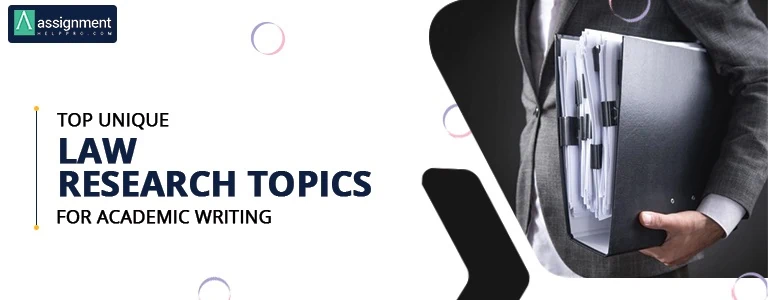
You may think that writing a law research paper is easy. But actually, it is not. For writing an intense legal research paper, you must have a unique legal research topic. Particularly, when writing law papers, you should first research and find the legal questions relevant to your topic, analyze the various legal precedents, and present the answer to your legal question in the form of a memo by properly citing all the sources you have used for references.
Law Research Paper Topic Selection Tips
If you want to write a law research paper, then a good law research topic is what you need. Basically, the law is a complex subject, and hence choosing the right research topic from them is challenging. While selecting the legal research topic, be sure to keep the following tips in mind.
- Your topic should not be too broad.
- It should be informative to your audience.
- The topic should be catchy and relevant to modern law.
- It should contain relevant supporting materials online or in local libraries.
- The topic should deal with relevant legal precedents.
- It should answer all the legal essay questions.
- Your topic should have real-life cases to illustrate your points.
List of the Best Law Research Paper Topics
Law is a popular discipline among humanitarian sciences that have a wide range of research areas. Some common law research areas include business law, commercial law, environmental law, international law, medical law, constitutional law, cyber law, family law and so on.
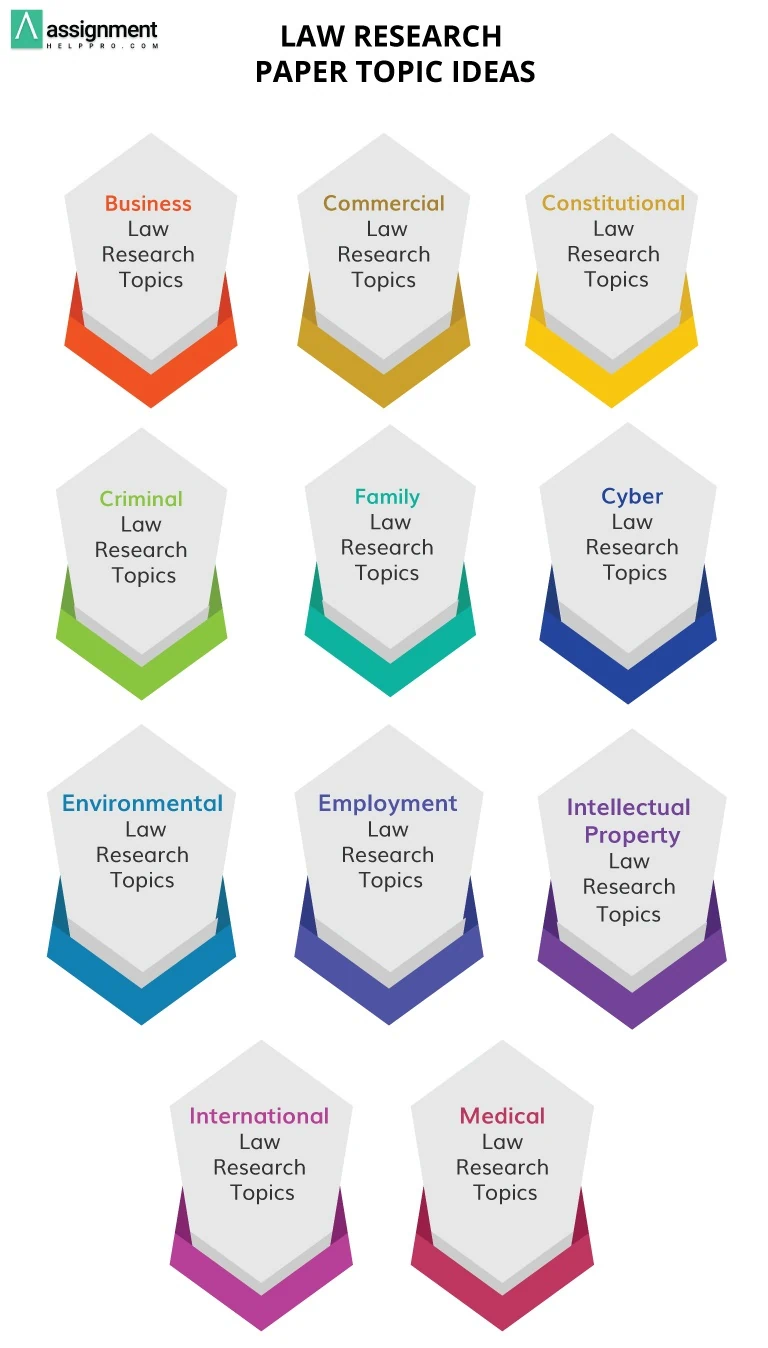
As law is a broad subject with endless research topics, it might be difficult for you to choose the most interesting idea from them. So, to make things easier, we have sorted different categories of law and listed some outstanding law research topics for you.
Have a look at the below-mentioned list of law research paper topic ideas and identify aprofound legal research topic of your choice.
Business Law Research Topics
- What’s the true nature of business law?
- Equity and the doctrines of business law
- Morality and its relation to business law
- Business laws and the parliament
- The formulation of business regulations in Islam
- Why are business regulations essential for institutions and organizations?
- Business laws in Africa
- How crucial is the constitution for the creation of business law?
- Business law as a profession
- The classification of the business regulations
- Describe the Law of Contracts in the United States
- Discuss the fundamentals of UK contract law for businesses
- Critical evaluation of the role of the judiciary bodies in corporate law
- Disclose an insight into contract laws with respect to the application of verbal and non-verbal agreements
- Importance of collective bargaining agreements and laws on labor relations
- How to deal with corruption in business law?
- Discuss the difference between the EU and the UK after the implementation of the Brexit Contract Law
- Discuss the protections provided to the minority shareholders in the corporate law regime of India
- Compare and contrast the legal aspects of corporate M&A (mergers and acquisitions) in the United States and Australia
- Analysis of the role of the Federal Trade Commission’s Bureau of Competition in regulating the anti-competitive practices in the market
- Compare and contrast the legal aspects of e-commerce in the US and the UK
- Critical analysis of the role played by the Arbitration and conciliation act in resolving business disputes
- Compare and contrast the company law act in Australia and Canada
- Discuss how anti-money laundering laws of a country impact businesses
- Describe the implications of digital payment systems
Commercial Law Research Paper Topics
- What are the dangers and potential results of commercial partnerships?
- A comprehensive analysis of pre-incorporation contracts: How do they work?
- Reviewing the use of international commercial law in energy projects across the globe.
- Assessing the mediating role of corporate social responsibility in companies’ performance.
- Evaluating the commercial laws that should be used against dishonest managers.
- Reviewing the US commercial laws: What should be changed or added?
- Evaluating the regulations aimed at stopping corruption: A case study of the UK.
- Reviewing the implications of international commercial law in UK commercial laws.
- Assessing the effectiveness of international commercial law programs in UK universities.
- Evaluating the effectiveness of commercial law to support commercial transactions in the US.
- Critical analysis of the Sarbanes-Oxley Act
- Discuss the benefits of Commercial Law
- Analyze the difficulties faced by businesses due to pursuing Regular or Commercial Lease
- Describe the effect of business law on commercial transactions and licensing
- Critical analysis of the labor law in Tanzania
- Develop a comparative study on international labor standards that regulate multinational companies in developing countries
Constitutional Law Research Topics
- The Internet and its impact on Free Speech
- The pros and cons of federalism
- What’s the freedom of the press?
- The desecration and flag burning
- A comparison between constitutions and state laws
- What are the rights of victims of self-incrimination?
- The pros and cons of Constitutionalism
- All about gun control and its history in the US
- What are the key changes that the First Amendment has brought?
- What changes did the Bill of Rights bring?
Criminal Law Research Topics
- Why does one crime have a set of different punishments?
- The roots of criminologists’ work and their work in modern times
- Can sociology have an impact on preventing crime?
- The ethical and legal issues related to criminal activity in your country.
- The real truth behind domestic violence
- What is quantitative criminology, and how does it differ from other types of crime?
- When does the international criminal court come into play?
- Analyzing the use of lie detectors in criminal justice: How effective are the lie detectors?
- A deeper look at the history of the death penalty.
- The key differences between male and female rape legislation
- Evaluating crime-related factors that should not be presented in a court of law.
- A thematic review of criminal theory: Exploring the link between crime and morality.
- What are the best ways to protect witnesses from retaliation in criminal cases?
- Is criminal profiling by law enforcement truly helpful in identifying serial killers?
- How does the criminal justice system keep an eye on police with body cameras?
Read more: Criminal Justice Research Topics Idea for students
Research Topics on Family Law
- Evaluating the impacts of the law on divorce: Has it increased the cases of divorce or reduced them?
- Review the important implications and reasons for changes to family law in the last 20 years.
- Assessing the factors that hinder couples from pursuing a divorce.
- The global issues and legal aspects of marriage and divorce of mentally unstable individuals.
- Explore divorce and social consequences across family law and religious perspectives.
- Analyze the legal foundations of parenting and civil partnerships.
- Assessing human rights in states that follow religious laws for families: A case study of India.
- Compare the divorce rights for women in Pakistan and the UK.
- How does culture impact decision-making on transgender marriages and divorce in the US?
- Evaluating the compatibility of child justice with family justice: A case study of the UK.
Cyber Law Research Topics
- The main cyber laws and enforcement today
- What are the skills of an excellent cyber lawyer?
- How can the government impact cyberterrorism?
- Cybercrime and cyberterrorism
- The penalties for cybercrime
- All about private data, revenge porn, blackmailing, and our internet privacy
- Is it the government’s job to analyze the flow of network traffic?
- Cyberlaw trends and how the online community sticks to them.
- The Internet Era and identity theft: Is it a crime of modern times?
- Categories of cybercrime and the main cybersecurity strategies against violators.
Read more: Interesting Cybercrime Research Topics To Deal With your paper
Research Ideas on Environmental Law
- The environmental influence on the rate of crime
- How has global environmental law changed today?
- The importance of environmental law for the health of current generations.
- Biological weapons and their regulations by international environmental law.
- Will the Uber industry impact the ecology in America?
- The current environmental regulations in the United States
- Sustainability and environmental compliance due to environmental law and economic reality.
- All about the environmental regulations in Canada
- Waste management in countries with a high economic level.
- Environmental law in Australia and climate change
Employment Law Research Topics
- A comprehensive review of employment contracts and job contracts in the US manufacturing industry.
- A legal viewpoint of employee mobility between European Union countries.
- Equal employment opportunities: Comparing gender differences in the UK and US regulations.
- Compare the UK laws before and after exiting the European Union.
- Reviewing legal perspectives of social work employment: A case study of California, USA.
- A comparative analysis of employment laws in the automotive industry in the US and UK.
- Analyze the impact of trade unions and their work in the UK.
- The convergence of employment laws and religion in the USA: A literature review.
- Evaluating the efficiency of workplace sexual harassment: A case study of the US and UK.
- A critical evaluation of the employment law of disabled individuals in the US.
Law Research Topics on Intellectual Property
- Evaluating laws for intellectual property rights protection on the internet.
- A comprehensive assessment of the economic impacts of intellectual property rights
- Evaluating the fair dealing in terms of copyright law: A case study of the US.
- How has EU law impacted the intellectual property regime in the UK?
- Can the emerging technological advancements operate smoothly with the current intellectual property laws in the US?
- Demystifying the relationship between intellectual property laws and EU regulations?
- Comparing and contrasting the intellectual property regimes in the UK and the US.
- Evaluating the implications of Brexit on the protection of intellectual property rights in the UK.
- Is the EU intellectual property law safe and fair for users and owners?
- Does the EU copyright law provide ample balance between the needs of inventors and users?
- Comparison of the institutions and regulations governing intellectual property in China and India
- An in-depth analysis of the UK’s invention and patenting system: Can the existing, rigid system stimulate innovation?
- Critical analysis of the development of copyright and moral rights in the legal system of Europe
- Infringement of foreign copyright and jurisdiction of the European Court
- Critical analysis of the economic rationale of Trademarks
- Analyze the emerging role of patents in innovation and intellectual property protection in the software industry
- Peer-to-Peer Technology: Analysis of contributory infringement and fair use
- Trademark protection is and ought to be the need of businesses to protect their brand value: Explain
- What do fair pricing and fair dealing with copyright regulations mean?
- Trade-Related Aspects of IP Rights: A Workable Instrument for Enforcing Benefit Sharing
International Law Research Paper Topics
- The principles used to formulate international criminal laws.
- Ethical systems and international relations
- Problems of code-based ethics
- How do different countries deal with false confessions?
- Different treatment of terrorism as a crime in different countries
- Diplomats and their protection of international morality.
- Did the US involvement in Iraq provide justice or violate the law?
- Laws on mental health in different countries
- The issues of traditional justification
- The question of ethics in the international legal context.
- International Human Rights Court Hearings: Evaluating the importance of precedence.
- What are the problems of enforcing international law in developing countries?
- Evaluating the efficiency of International Tribunals in solving war crimes.
- Digital and internet legislation: Forecasting the future.
- Assessing the relationship between public safety and civil liberties in international laws.
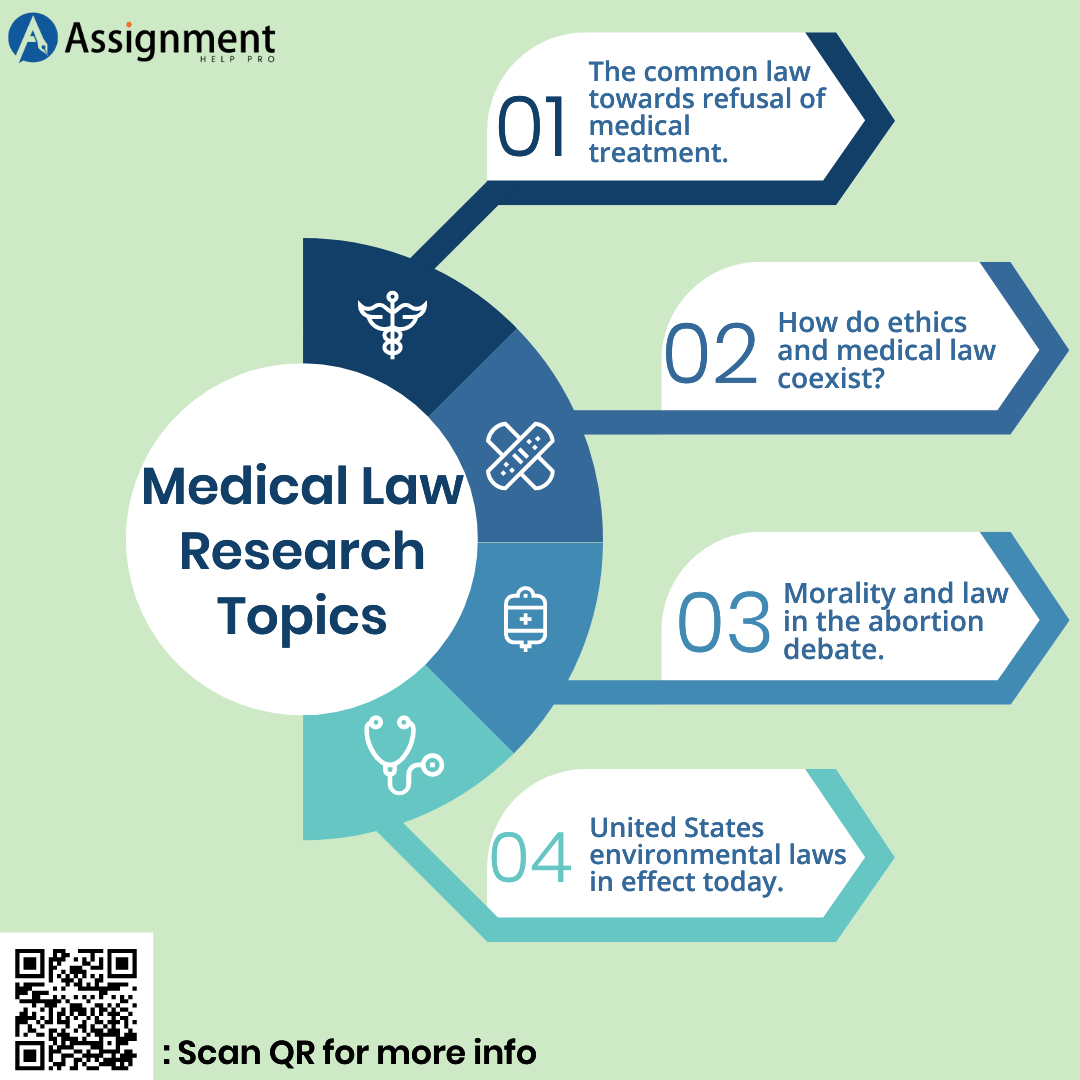
Medical Law Research Topics
- The common law towards refusal of medical treatment.
- Evaluating the laws governing organ transplantation: A case study of the US .
- How do ethics and medical law coexist?
- Ethics and Medical Laws in World War II
- Law application in medicine: Exploring the antecedents and practice.
- Evaluating the ethical and legal challenges of using biobanks.
- Exploring the legal aspects of electronic fetal monitoring.
- How do lawsuits affect medical practitioners’ commitment to offering lifesaving treatments?
- Unregistered medical intervention in the UK: What are the legal implications?
- Morality and law in the abortion debate.
- In accordance with international environmental law, biological weapons are prohibited.
- Will the Uber industry have an impact on American ecology?
- United States environmental laws are in effect today.
- Due to environmental legislation and economic reality, sustainability, and environmental compliance.
- anything about Canadian environmental laws.
- evaluating aspects of crime that shouldn’t be discussed in court.
- What are the best strategies for shielding witnesses in criminal cases from reprisals?
- A more thorough examination of the death penalty’s past
- Examining the connection between crime and morality is the focus of this examination of criminal theory.
- A case study of London’s examination into the difficulties in determining the type and distribution of crime.
A Few More Medical Law Research Ideas
- How to balance the rights of defendants and victims when using anonymity in sexual offense litigation.
- Slavery, prostitution, and human trafficking. the methods used globally to eradicate it.
- Is identity theft a modern-day crime? prevention of identity theft in the post-Internet era.
- criminality and psychology. Are some people more likely than others to breach the law?
- Social control theory against the self-control hypothesis
- False confessions and how they are handled in various nations.
- The environment’s impact on crime rates is one of the theories behind shattered windows.
- Similarities and disparities between mental diseases and crime in various nations.
- education, criminal behavior, and intelligence.
- From the beginning to the present, criminologists’ fieldwork.
- How does quantitative criminology differ from other types of crime? What is it?
- When is the use of the international criminal court appropriate?
- Examining the effectiveness of lie detectors in the criminal justice system:
- A more thorough investigation of the death penalty’s past.
- The main distinctions between male and female rape laws
- Assessing criminal-related variables that shouldn’t be brought up in court.
- What effects has EU law had on the UK’s system of intellectual property?
- Can the advancing technologies coexist peacefully with the US’s current intellectual property laws?
- Explaining the connection between EU rules and intellectual property laws?
Trending Law Research Topics
- Discuss the role of genetics in criminal justice proceedings.
- Write about the recent changes in tax laws and their impact on India.
- Differences between state and federal regulations regarding gun control.
- Discuss the growing influence of artificial intelligence on the legal profession.
- Explain the role of technology in criminal trials.
- Analyze international human rights policies.
- Write about the Freedom of expression and censorship issues.
- Discuss the Legal issues related to school safety and security.
- Analyze the regulation of online gaming platforms from a legal perspective.
- Write about the Legal implications of celebrity endorsements.
Wrapping Up
In order to get top grades for your law research paper, a peculiar topic is mainly needed. Especially, by choosing an idea from the list of 150+ law research topics suggested in this blog post, you can write a top-quality academic paper and make your work stand out in the crowd. In case you find it difficult to write a legal research paper, then immediately reach out to us for professional Law assignment help . We have a team of academic writers who are experts in the field of law to assist you in completing your law research paper on any impressive topic as per requirements.
Simply, book your order and get an original law research paper beyond your expectations.

Related Post

220 Amazing Religious Research Paper Topics and Ideas

Read and Understand How to Write a Research Proposal

100+ Controversial Research Topics and Ideas to Focus On
About author.
Jacob Smith
I am an Academic Writer and have affection to share my knowledge through posts’. I do not feel tiredness while research and analyzing the things. Sometime, I write down hundred of research topics as per the students requirements. I want to share solution oriented content to the students.
Leave a Reply Cancel reply
You must be logged in to post a comment.
- Featured Posts
140 Unique Geology Research Topics to Focus On
200+ outstanding world history topics and ideas 2023, 190 excellent ap research topics and ideas, 150+ trending group discussion topics and ideas, 170 funny speech topics to blow the minds of audience, who invented exams learn the history of examination, how to focus on reading 15 effective tips for better concentration, what is a rhetorical analysis essay and how to write it, primary school teacher in australia- eligibility, job role, career options, and salary, 4 steps to build a flawless business letter format, get help instantly.
Raise Your Grades with Assignment Help Pro
- How It Works
- PhD thesis writing
- Master thesis writing
- Bachelor thesis writing
- Dissertation writing service
- Dissertation abstract writing
- Thesis proposal writing
- Thesis editing service
- Thesis proofreading service
- Thesis formatting service
- Coursework writing service
- Research paper writing service
- Architecture thesis writing
- Computer science thesis writing
- Engineering thesis writing
- History thesis writing
- MBA thesis writing
- Nursing dissertation writing
- Psychology dissertation writing
- Sociology thesis writing
- Statistics dissertation writing
- Buy dissertation online
- Write my dissertation
- Cheap thesis
- Cheap dissertation
- Custom dissertation
- Dissertation help
- Pay for thesis
- Pay for dissertation
- Senior thesis
- Write my thesis
100 Best Media Topics For Research Writing

We know you need the best media topics for your next papers. Otherwise, why would you be reading this blog post? The good news is that you have picked the best place to look for topics. Our experienced writers have put together a list of the best media topics for high school and college students. Furthermore, we work hard to keep the list fresh. This means that these ideas will be most likely original. They will work great in 2023 because the list of media essay topics is updated periodically.
The Importance of Great Media Topics
You are probably wondering why we are putting so much emphasis on getting you the best media topics to write about. There are several reasons for it, but we will only tell you about 3 of them:
- Your professor will greatly appreciate your willingness to dedicate the time and effort to finding excellent topics . Trust us, professors know how to make the difference between students based solely on the topics they choose for their papers.
- It is much easier to write essays if you choose good media essays topics . A topic you know something about is the best choice. Also, a good topic enables you to quickly find plenty of information on the Internet. Following this advice you’ll easily write your literature review and the following components of your paper.
- By choosing a great topic, your essay will immediately stand out from all the rest . Your professor is surely bored of reading papers written about the same things over and over again. An interesting idea will entice him to award you at least some bonus points.
Mass Media Topics
Mass media is something of great importance in modern times, so why not write your papers on some mass media topics? Here are some great examples:
- The effect of mass media on psychological health
- Mass media and emotional health
- Mass media addiction in the US
- The role of mass media in politics
- The First Amendment in mass media
- Promoting sexuality in mass media
Media Research Topics
Did your professor ask of you to write a research paper? No problem, we have some excellent media research topics in our list. Check them out below:
- Discuss children media
- Violence in mass media in the US
- Video games in the media
- Controversial topics in the media in Europe
- Discuss post-truth in the media
- Media regulations in China
Media Analysis Essay Topics for Presentation
Would you like to write a media analysis paper for a presentation? It’s not difficult to do, if you pick the right media analysis essay topics for presentation. Here are some excellent ideas:
- Is the media creating events or reacting to them?
- Media and public relations links
- Discuss 3 major types of media
- The use of media in education (one of the most interesting mass media research paper topics)
- Influence of virtual reality on the media (one of the best media analysis essay topics)
- Discuss journalism ethics
Media Research Paper Topics for High School
Are you a high school student looking for some awesome topic for his next research paper on media? Here are some excellent examples of media research paper topics for high school:
- Major innovations in 21st century media
- Compare mainstream media in India and China
- What makes an outlet a reliable source?
- Advertisements in media
- Benefits of mass media for society
- Compare traditional media with mass media
Mass Media Research Topics
If you need to write a research paper and want to talk about something in mass media, we have some very nice ideas right here. Check out our mass media research topics:
- The right of expression in mass media
- Journalism in mass media
- Compare TV, film and radio
- Mass media in democracy
- The war against terror in mass media
- Discuss the rise of mobile media
Media Research Topics for College Students
College students who are looking to research topics about media should choose something that can bring them a top grade. Here are our best media research topics for college students:
- Influences of technology on media
- Latest innovations in media
- Discuss media censorship in China (a recommended media related topic)
- What is media propaganda?
- Mass media and its preemptive effects
Complex Media Related Research Topics
Do you want to try your hand at some difficult topics? If you want to impress your professor, we advise you to select one of these complex media related research topics:
- Mass media violating civil rights
- Does media benefit the economy of the US?
- Define media addition and discuss its effects
- Perform a qualitative analysis of 3 media outlets
- Media’s scare strategies: a case study
- Media influencing a rise in violence in the UK
Controversial Media Topics
Why should you be frightened by controversial topics? You are free to write about them, of course. Here are our best and most controversial media topics:
- Exercising the First Amendment in media in the US
- Promoting gun violence in mass media
- Mass media effects on terrorism
- Digital media is destroying traditional media
- Artificial intelligence in mass media
- Media effects on the death penalty in China
Digital Media Topics
Discussing digital media is a very good way to impress your professor. Let’s face it; the digital realm is extremely popular these days. Here are some brand new digital media topics:
- Define and discuss digital media
- Climate change in digital media
- What is mobile media?
- The fate of journalism in the 21st century (one of the best digital media research topics)
- Effects of digital media on politics
Media Analysis Topics
Writing a media analysis essay can be a very difficult task, especially if you don’t have much academic writing experience. Here are some media analysis topics that should make things easier:
- How Trump lost the media war
- Biden’s coverage in mass media in the United States
- Advertising revenue in media outlets
- Analyze screen time
- What are deepfakes and how to spot one?
- The crisis of journalism in the 21st century
Easy Media Related Topics
The perfect choice for times when you simply cannot afford to spend too much time writing your essay, our list easy media related topics is right here:
- Define mass media in the United Kingdom
- Should children watch the news?
- Promoting violence in mass media
- Spreading awareness via media
- Are newspapers still relevant today?
- The very first occurrence of mass media
Research Topics in Media and Communication
Would you like to talk about media and communication? It is not an easy subject to write about, but we can make things easier. Here are the easiest research topics in media and communication:
- Discuss body image in media
- Analyze children’s advertising tactics
- Freedom of speech in the media
- Copyright law in the media
- Define symmetrical dialogue in the media
Media Debate Topics
Are you interested in a media debate? Getting the best topics for 2023 should be your primary concern in this case. We have some very interesting media debate topics right here:
- The impact of public relations on communities
- Location-based advertising in modern media
- Analyze the concept of yellow journalism
- Good news vs bad news in the media
- Discuss the concept of proportionality in media
Brand New Media Topics
Just like you, our writers are interested in writing about the latest topics. Why don’t you pick one of our brand new media topics?
- Is radio still an important part of media?
- Newspapers going bankrupt in 2023
- Sexual content on TV shows
- Politicians’ love for the media
- Is the backing of the media important for a president?
Media Ethics Topics
Discussing ethics in relation to media is a very interesting choice. It can also get you an A+ on your next paper. Here are some exceptional media ethics topics:
- Including graphic images in media
- Depicting terrorism on TV
- Regulating newspapers in Europe
- Celebrity gossip in the media
- The influence of large media corporations
Media Law Topics
Yes, there is such a thing as media law. Would you like to write an essay about it? Here are some great ideas for media law topics:
- Discuss the First Amendment and media
- The responsibilities of journalists
- Journalists in war zones
- Fake news in the media
- Showing unsuitable content to children
Research Topics in Communication and Media Studies
Writing about communication and media studies has the potential to help you get a top grade. Here are our best research topics in communication and media studies:
- Analyze media bias in the United States
- Is digital media addictive?
- Influence of media on religion
Interesting Media Topics
We know, you want the most interesting media topics to write about. Pick one of these and write a paper that will impress your professor:
- State-controlled media in China
- Effects of media coverage on criminal trials
- The power of mass media in 2023
Trending Media Topics
You may not know which topics are trending when it comes to media, but our writers do. Here are the latest trending media topics:
- The war in Afghanistan
- Joe Biden’s rise to power
- The fall of Donald Trump
- Climate change problems
- Global warming in the media
But what if you need more topics or professional help with thesis ? What if you didn’t find the media research topic you were looking for in the list above? While this is highly unlikely, we are prepared to help you. Would you like to talk about media literacy? In case you do, our ENL writers can create a list of the most interesting (and new) media literacy topics you can find. For anything you need, just get in touch with us.

Leave a Reply Cancel reply
Your email address will not be published. Required fields are marked *
Comment * Error message
Name * Error message
Email * Error message
Save my name, email, and website in this browser for the next time I comment.
As Putin continues killing civilians, bombing kindergartens, and threatening WWIII, Ukraine fights for the world's peaceful future.
Ukraine Live Updates
How social media is changing defamation law
- Expert Viewpoint
- Pritzker School of Law
Social media has radically changed the way people receive and share information or opinions about one another. Unfounded statements on the Internet can enter the mainstream in a viral moment, as seen in a recent series of high-profile cases that use defamation law to fight online misinformation and untruths.
Hosted by Northwestern Pritzker School of Law and the Medill School of Journalism, Media, Integrated Marking Communications, a panel, “How is Social Media Changing Defamation Law?” was held recently in recognition of the 60th anniversary of the 1965 U.S. Supreme Court decision New York Times Co. v. Sullivan, which revolutionized libel law. The historic ruling determined that freedom of speech protections restrict the ability of public officials to sue for defamation.
In two recent defamation cases, that of E. Jean Carroll against former President Donald Trump and the case brought by two election workers against Rudy Giuliani, juries awarded a total of more than $230 million to people whose lives were turned upside down by — in these cases — the public figures themselves and their followers on social media.
“(These cases are) not an attempt to silence the truth, a concern that animated Sullivan, but to use liable suits to silence the lying that was taking place online and elsewhere,” said senior vice president and deputy general counsel at the New York Times Company David McCraw, who moderated the panel.
All Northwestern alumni, the featured panelists served as counsel in the Carroll v. Trump and Freeman v. Giuliani cases: Shawn G. Crowley ’06, partner at Kaplan Heckler & Fink; Meryl Governski ’04 MS, partner at Willkie Farr & Gallagher; Michael Gottlieb ’99, partner at Willkie Farr & Gallagher; and Ashlee Humphreys ’03, ’08 Ph.D., associate professor of integrated marketing communications at Medill, who testified as an expert on reputational damage to plaintiffs in both trials.
Author E. Jean Carroll sued Donald Trump for defamation after he accused her of lying in her 2019 memoir that he had sexually assaulted her. She won more than $88 million in two separate suits.
“When the president speaks, the world listens, especially a president who has access to Twitter,” said Crowley, the lead attorney in Carroll v. Trump. “The statement that Carroll was lying to sell books, that spread all over the world very, very quickly. (Carroll) immediately started getting hate mail, death threats and horrible messages which have continued for the last five years.”
Gottlieb and Governski were the lead counsel on the Freeman v. Giuliani case, brought by election workers Ruby Freeman and Shaye Moss who sued Rudy Giuliani for defamation – after deliberately spreading lies that they committed election fraud.
Gottlieb compared what happened to his clients to the notoriety of being famous, but not having access to the power or money to deal with it.
“Imagine all the stuff that a celebrity has to deal with, the bad stuff they have to deal with, and then imagine that they had no money, no power or no authority to deal with it,” he said.
Humphreys said there is a unique challenge in quantifying harm done to a plaintiff that is not famous or of notoriety.
“When a famous person sues for defamation, they have existing reputations that can be quantified by the movie deals that they've missed out on or other work that was taken away,” she said. “But we all have reputations, so how do you come up with a number?”
As an expert witness, Humphries based damages on the number of people who see the defamatory content online, factor in impressions to capture how widely it spread, and assess its impact.
“All of this affects a person’s reputation in the world, famous or not,” she said.
Even in light of these high-profile settlements, Gottlieb says he doesn’t think it will stop the political theatre of spreading lies, but the attacks may become less specific.
“I hope that at least people who are engaged in the sport of politics this year will take that message that there's a way to do this and say all the same stuff you want to say without destroying civil servants in the process.”
Editor’s Picks

Redevelopment of Norris University Center’s East Lawn to begin this summer
‘the night watchman’ named next one book selection, the healing powers of theater, related stories.
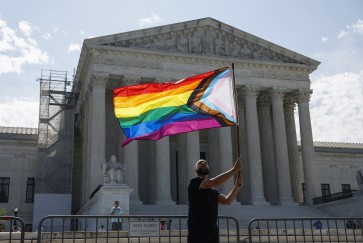
Grappling with the impact of anti-LGBTQ+ laws
Ruling marks ‘end of an era’ for affirmative action, posthumous pardon hearing to be held in case of springfield race riot of 1908.

- Rosters & E-Bidding
Have a Research Question?
- Research Tools
- Explore Topics
- Stay Informed
- Publications
U.S. Supreme Court Changes Law on Government First Amendment Liability for Social Media Activities
April 8, 2024 by Harry Boesche Category: Court Decisions and AGO Opinions , Social Media

The U.S. Supreme Court (Court) recently decided Lindke v. Freed . The case changes Washington law regarding government social media liability and has important implications for local government officials and their agency employers.
Lindke addressed whether a public official violates the First Amendment by deleting or blocking public responses to job-related comments the official posts to their personal social media account. Lindke holds that public officials are only liable for social media First Amendment violations when the official:
- has actual government speaking authority on the involved social media topic; and
- uses that actual speaking authority in the involved social media exchange.
Lindke overturns the Ninth Circuit Court of Appeals Garnier v. O’Connor-Ratcliff decision ( vacated and remanded by the Court due to Lindke ), which was previously Washington’s leading case on this topic.
Unlike the Lindke ruling, Garnier had held that public officials are liable for violating commentor’s First Amendment rights if the official’s social media activity created even an appearance of government speaking authority. Lindke ’s ruling now requiring actual speaking authority before an official can be found liable provides clear guardrails for both public officials and local governments.
A Background of the Problem
Local governments and officials (including mayors, city councilmembers, district commissioners and other officials) frequently use social media to disseminate information and to respond to public concerns or requests. Given social media’s popularity and effectiveness, this is unlikely to change and will likely only continue and increase.
However, public officials’ social media use also creates legal issues since government social media can create a public forum impacting public First Amendment rights. Public officials who delete or block public comments on government-hosted social media platforms limit the public’s access to this forum and, accordingly, may be liable for a First Amendment violation through “state action” under federal law ( 42 U.S.C. §1983 ). Since many agencies cover their officials’ job-related liabilities, an official’s liability can become the agencies’ also.
Governments agencies that own and control their social media platforms can navigate these legal issues more easily. Things get tougher when public officials discuss job-related matters on their personal social media sources, as it gets harder to tell when the official is speaking and acting officially (and subject to First Amendment liability) and when the official is free from such liability by speaking and acting personally . The obvious question becomes: When is an official’s personal social media use “job related,” creating this potential First Amendment liability?
Lindke answers this question and changes previous Washington law in the process.
The Lindke Case
The Lindke case involved Port Huron (MI) City Manager James Freed using his personal (but publicly open) Facebook account to post both personal and job-related comments about the COVID-19 pandemic. Freed’s personal posts related to changes in family activities during the pandemic, while his job-related posts described his city’s hiring freeze and included a city press release. Port Huron resident Kevin Lindke responded to Freed’s account posts, complaining about the city’s overall pandemic response and criticizing specific actions of city leaders during the pandemic. Freed deleted Lindke’s comments and later blocked Lindke from commenting altogether.
Lindke sued Freed in federal court, claiming that Freed’s social media blocking violated Lindke’s First Amendment rights through state action under 42 U.S.C. §1983 . The Court held that a public official’s social media activity is state action under 42 U.S.C. §1983 only if the official meets both of these two requirements:
- The official had the government’s actual speaking authority on the specific social media topic involved . Whether an official has this actual government speaking authority is fact-specific and can’t be determined by an official’s government employee status alone. Instead, an official’s government speaking authority depends on the specific responsibilities that an agency has entrusted the official to perform.
- The official used their actual government speaking authority in the involved social media activity . An official with actual government speaking authority uses it when they use social media to speak in their official capacity or to further their official or legal responsibilities.
Officials and agencies cannot be found liable for First Amendment violations for social media use falling outside of this actual and used authority. The Court also noted that social media accounts labeled “personal” are entitled to “heavy presumptions” that posts to the account are personal and not attributable to the government. Likewise, an official’s social media communications that merely repeat or share already publicly available information are more likely personal than official.
How Lindke Changes Washington Law
Before Lindke , the Ninth Circuit Court of Appeals Garnier case regulated Washington in the question of public official First Amendment liability for social media use.
Garnier involved two school district trustees using Facebook and Twitter (i.e., X) accounts to communicate with constituents about district issues. The trustees blocked unfavorable comments posted to the accounts by two district parents. The parents sued, arguing that the trustees’ comment blocks were state actions infringing their First Amendment rights and triggering 42 U.S.C. §1983 liability.
In contrast to Lindke , the Garnier court decided the case by focusing on what the trustees’ social media accounts portrayed to the public and how the public reacted to the portrayal. Public officials are only liable for social media First Amendment violations if their social media use is sufficiently and legally connected to their job. Garnier found this legal connection if the officials’ social media activity made the public think that the government authorized it. Lindke finds this connection only when the government has in fact authorized the official’s social media activity.
Lindke ’s focus on a public official’s actual authority in determining social media liability under 42 U.S.C §1983 presents a few takeaways. Local governments should:
- create and designate social media accounts for public officials;
- establish clear parameters on an official’s speaking authority; and
- adopt rules to “mark” statements by officials.
Create and clearly designate social media accounts for use by officials
As stated above, the legal pitfalls related to social media use become most prominent when officials use personal accounts for official purposes. Lindke ’s heavy presumption that social media statements posted to a personal account indicates that clear designations of account ownership can help navigate questions of government liability for social media activity.
Lindke also noted that the potential for an official’s liability increases when the official fails to confine personal posts in a clearly designated personal social media account. Ensuring that officials have a clear path for “authorized” speaking lessens the temptation of mixing personal and official speech.
Establish clear parameters on an official’s speaking authority
As Lindke noted, an official is only liable for censoring social media posts that are connected to the official’s authority. An official’s authority can be established through formal enactments like ordinances, governing body and department head policies, or from prior practices that create a “permanent and well-settled” recognition of the official’s authority to speak on particular agency matters.
Adopt rules to “mark” statements of officials
In further refining the requirement that officials act pursuant to their speaking authority to be liable, Lindke noted that statements “marking” the parameters of an official’s social media activity (such as: “This is the personal page of…” or “The views expressed are my own”) give the benefit of clear context to meet the heavy presumption in favor of personal statements and against liability. Rules for officials to help them navigate communications can greatly assist in this area.
A note about public records — Lindke does not change the Washington Supreme Court’s interpretation of the Public Records Act and the application of the “scope of employment” test to determine whether activity on a personal social media account rises to the level of being a public record. For more on this topic, see the MRSC blog: New Ruling Finds Facebook Posts Can Be a Public Record .
MRSC is a private nonprofit organization serving local governments in Washington State. Eligible government agencies in Washington State may use our free, one-on-one Ask MRSC service to get answers to legal, policy, or financial questions.
About Harry Boesche
Blog archives, weekly e-news.
Get the latest local government news, analysis, and training opportunities in Washington State with MRSC’s Weekly Insights .
Related Materials
Ninth Circuit Holds Reed v. Town of Gilbert Does Not Extend to Commercial Speech
Appellate court upholds Spokane initiative restricting homeless encampments
I am a newly elected councilmember. May I set up my own website (at my own expense) to provide a forum to communicate with my constituents?
Recent Attorney General Opinions of Interest to Local Governments
Slots Open for Interview Growthcamp | Enroll Now
Admissions Open for Six Weeks' Holistic Development Growthcamp- Click To Know More | Admissions Open for Six Weeks' Holistic Development Growthcamp- Click To Know More | Admissions Open for Six Weeks' Holistic Development Growthcamp- Click To Know More

50 Research Topics For Law Students In August 2022: Read Now!
If you are a law student and love research, here’s our flagship article. Our team has meticulously prepared a list of 50 top contemporary topics for research in August 2022 across a number of legal subjects . Happy Researching!
Military law 1. Military Law v. Martial Law: A Comparative Study. 2. Authorities under Military Law in India. 3. Punishments under Military Law v. Civil Law: A Comparative Study. 4. Evolution of Military Law in India. Admiralty (Maritime) Law 1. Local laws v. Maritime Law: Which shall prevail? 2. Suez Canal crisis: What it cost the world? 3. 10 Things to Know Before Becoming A Maritime Lawyer 4. Enforcement of Maritime Law: A Critical Analysis 5. Relevance of South China Sea Globally. Bankruptcy Law 1. Efficiency of Fast track Resolution Process in India. 2. Authorities governing Insolvency and Bankruptcy in India: An Analysis 3. Cross-Border Insolvency in India. 4. Evolution of insolvency and bankruptcy laws in India: Landmark Judgments Business (Corporate) Law 1. Corporate Law Journals to Publish Your Research Paper. 2. Effective corporate governance laws: A Review 3. Top Research Journals for Corporate Law in India.
Civil Rights Law 1. Beef in India: A Study into Religious aspect 2. Drug abuse in India: A Critical analysis of Sushant Singh Rajput case. 3. Females of Islam: A Study 4. A critical analysis of Niqah Halala in Islam. 5. Maintenance to wives, children and parents in India: A Study through Landmark cases. Criminal law 1. Constitutional perspective of Criminal Procedure Code. 2. A critical Analysis of Plea bargaining Procedure. 3. Sex work in India: Morality v. Legality 4. Appeal, Review, Revision of Cases in India. 5. Rationale behind Death Penalty in India: A Critical Analysis. Entertainment law 1. Entertainment Law in India: A Jurisprudential Study. 2. An Introduction to Entertainment Law: A Basic Study. 3. Regulation of Pornography in OTT Platforms. 4. Royalties of Artistic Works in India: A Study 5. Regulations on Piracy and Pirated Works. Environment law 1. Indian environmental law for the sustainability of the resources and management: A critical assessment. 2. Politics v. Environment Law: A Study. 3. Important International Treaties on Climate Change. 4. Kyoto Protocol: Landmark Treaty on Climate Change.
Health law 1. Analysis of Insanity in Law. 2. Regulation of Donation of Organs in India and Globally. 3. Jurisprudence of Health law. 4. Right to Die: Law and Legislation. 5. Law and Biotechnology. Sports law 1. Sports Industry Law and Regulation: A Need of the Hour. 2. Relevance of sports law in India. 3. India’s Draft National Air Sports Policy 2022: A brief analysis. 4. Sports law and its aspect of Intellectual Property Rights. 5. Analysing the future of Sports Law in India. Moneylaundering law 1. Analysing India’s money laundering and anti-money laundering (AML) laws and regulations. 2. Hasan Ali Khan v Union of India: Case Analysis. 3. Analysing the legal issues in JKCA money laundering case. 4. Vijay Madanlal Choudhary & Ors. v. Union of India: Case Analysis. 5. The powers of the Directorate of Enforcement in Anti-Money Laundering cases.
YLCC would like to thank Akhila Sawan for her valuable contribution in this publication.
Related Posts
Job Opportunity (Recovery Officer) @ Varthana: Apply Now!

Job Opportunity (Head of Legal Role) @ Junglee Pictures: Apply Now!
Job opportunity (associate) @ abha singh law offices: apply now.

Internship Opportunity (Intern) @ Meesho: Apply Now!
Cookie policy, privacy overview.
Hit enter to search or ESC to close
WhatsApp Us

Read our research on: Gun Policy | International Conflict | Election 2024
Regions & Countries
9 facts about americans and marijuana.

The use and possession of marijuana is illegal under U.S. federal law, but about three-quarters of states have legalized the drug for medical or recreational purposes. The changing legal landscape has coincided with a decades-long rise in public support for legalization, which a majority of Americans now favor.
Here are nine facts about Americans’ views of and experiences with marijuana, based on Pew Research Center surveys and other sources.
As more states legalize marijuana, Pew Research Center looked at Americans’ opinions on legalization and how these views have changed over time.
Data comes from surveys by the Center, Gallup , and the 2022 National Survey on Drug Use and Health from the U.S. Substance Abuse and Mental Health Services Administration. Information about the jurisdictions where marijuana is legal at the state level comes from the National Organization for the Reform of Marijuana Laws .
More information about the Center surveys cited in the analysis, including the questions asked and their methodologies, can be found at the links in the text.
Around nine-in-ten Americans say marijuana should be legal for medical or recreational use, according to a January 2024 Pew Research Center survey . An overwhelming majority of U.S. adults (88%) say either that marijuana should be legal for medical use only (32%) or that it should be legal for medical and recreational use (57%). Just 11% say the drug should not be legal in any form. These views have held relatively steady over the past five years.
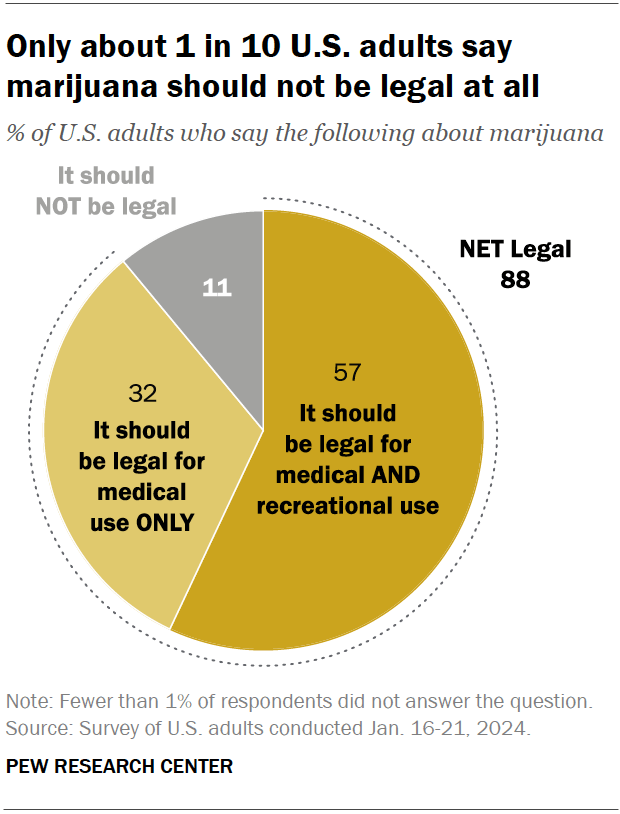
Views on marijuana legalization differ widely by age, political party, and race and ethnicity, the January survey shows.

While small shares across demographic groups say marijuana should not be legal at all, those least likely to favor it for both medical and recreational use include:
- Older adults: 31% of adults ages 75 and older support marijuana legalization for medical and recreational purposes, compared with half of those ages 65 to 74, the next youngest age category. By contrast, 71% of adults under 30 support legalization for both uses.
- Republicans and GOP-leaning independents: 42% of Republicans favor legalizing marijuana for both uses, compared with 72% of Democrats and Democratic leaners. Ideological differences exist as well: Within both parties, those who are more conservative are less likely to support legalization.
- Hispanic and Asian Americans: 45% in each group support legalizing the drug for medical and recreational use. Larger shares of Black (65%) and White (59%) adults hold this view.
Support for marijuana legalization has increased dramatically over the last two decades. In addition to asking specifically about medical and recreational use of the drug, both the Center and Gallup have asked Americans about legalizing marijuana use in a general way. Gallup asked this question most recently, in 2023. That year, 70% of adults expressed support for legalization, more than double the share who said they favored it in 2000.
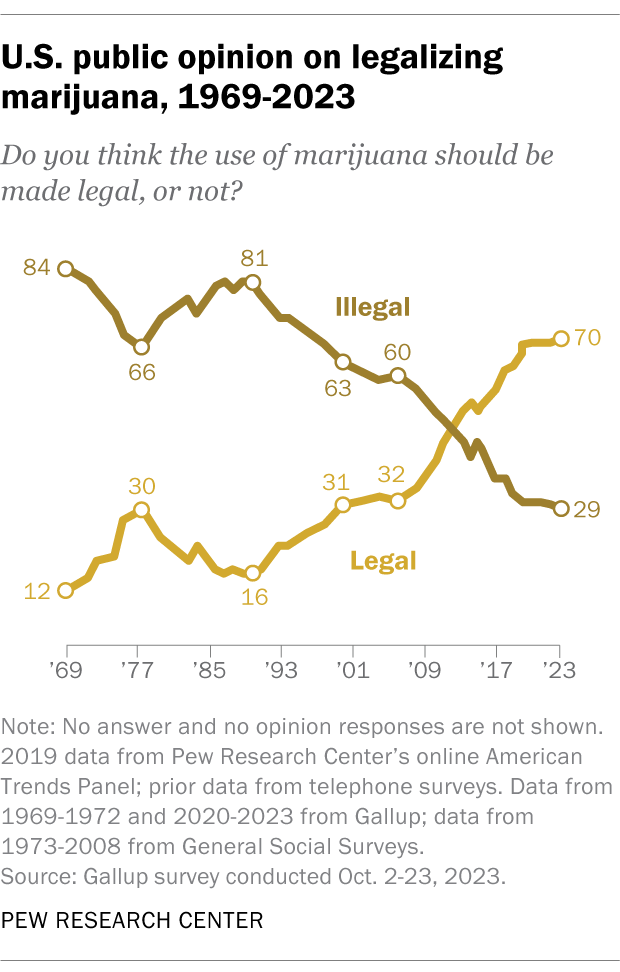
Half of U.S. adults (50.3%) say they have ever used marijuana, according to the 2022 National Survey on Drug Use and Health . That is a smaller share than the 84.1% who say they have ever consumed alcohol and the 64.8% who have ever used tobacco products or vaped nicotine.
While many Americans say they have used marijuana in their lifetime, far fewer are current users, according to the same survey. In 2022, 23.0% of adults said they had used the drug in the past year, while 15.9% said they had used it in the past month.
While many Americans say legalizing recreational marijuana has economic and criminal justice benefits, views on these and other impacts vary, the Center’s January survey shows.
- Economic benefits: About half of adults (52%) say that legalizing recreational marijuana is good for local economies, while 17% say it is bad. Another 29% say it has no impact.
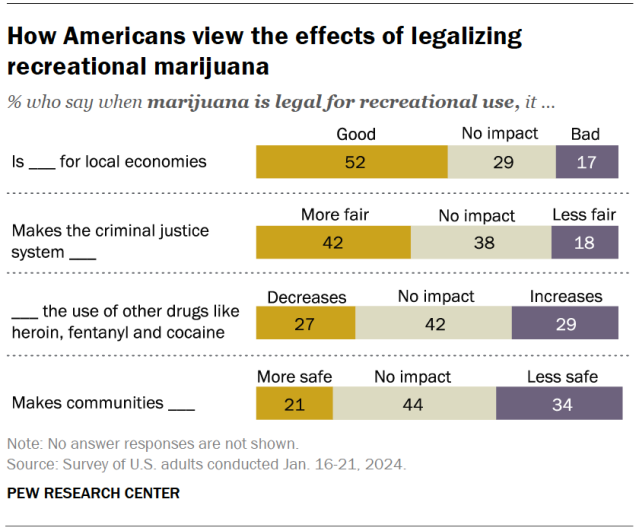
- Criminal justice system fairness: 42% of Americans say legalizing marijuana for recreational use makes the criminal justice system fairer, compared with 18% who say it makes the system less fair. About four-in-ten (38%) say it has no impact.
- Use of other drugs: 27% say this policy decreases the use of other drugs like heroin, fentanyl and cocaine, and 29% say it increases it. But the largest share (42%) say it has no effect on other drug use.
- Community safety: 21% say recreational legalization makes communities safer and 34% say it makes them less safe. Another 44% say it doesn’t impact safety.
Democrats and adults under 50 are more likely than Republicans and those in older age groups to say legalizing marijuana has positive impacts in each of these areas.
Most Americans support easing penalties for people with marijuana convictions, an October 2021 Center survey found . Two-thirds of adults say they favor releasing people from prison who are being held for marijuana-related offenses only, including 41% who strongly favor this. And 61% support removing or expunging marijuana-related offenses from people’s criminal records.
Younger adults, Democrats and Black Americans are especially likely to support these changes. For instance, 74% of Black adults favor releasing people from prison who are being held only for marijuana-related offenses, and just as many favor removing or expunging marijuana-related offenses from criminal records.
Twenty-four states and the District of Columbia have legalized small amounts of marijuana for both medical and recreational use as of March 2024, according to the National Organization for the Reform of Marijuana Laws (NORML), an advocacy group that tracks state-level legislation on the issue. Another 14 states have legalized the drug for medical use only.
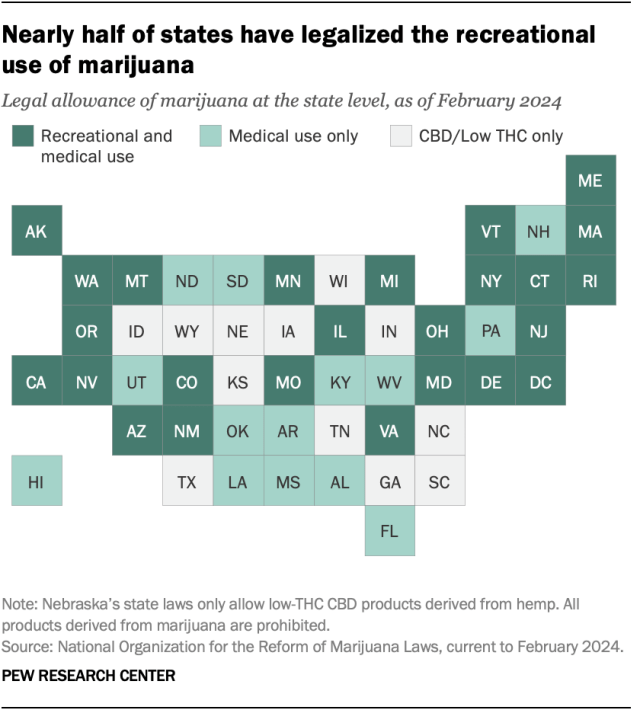
Of the remaining 12 states, all allow limited access to products such as CBD oil that contain little to no THC – the main psychoactive substance in cannabis. And 26 states overall have at least partially decriminalized recreational marijuana use , as has the District of Columbia.
In addition to 24 states and D.C., the U.S. Virgin Islands , Guam and the Northern Mariana Islands have legalized marijuana for medical and recreational use.
More than half of Americans (54%) live in a state where both recreational and medical marijuana are legal, and 74% live in a state where it’s legal either for both purposes or medical use only, according to a February Center analysis of data from the Census Bureau and other outside sources. This analysis looked at state-level legislation in all 50 states and the District of Columbia.
In 2012, Colorado and Washington became the first states to pass legislation legalizing recreational marijuana.
About eight-in-ten Americans (79%) live in a county with at least one cannabis dispensary, according to the February analysis. There are nearly 15,000 marijuana dispensaries nationwide, and 76% are in states (including D.C.) where recreational use is legal. Another 23% are in medical marijuana-only states, and 1% are in states that have made legal allowances for low-percentage THC or CBD-only products.
The states with the largest number of dispensaries include California, Oklahoma, Florida, Colorado and Michigan.
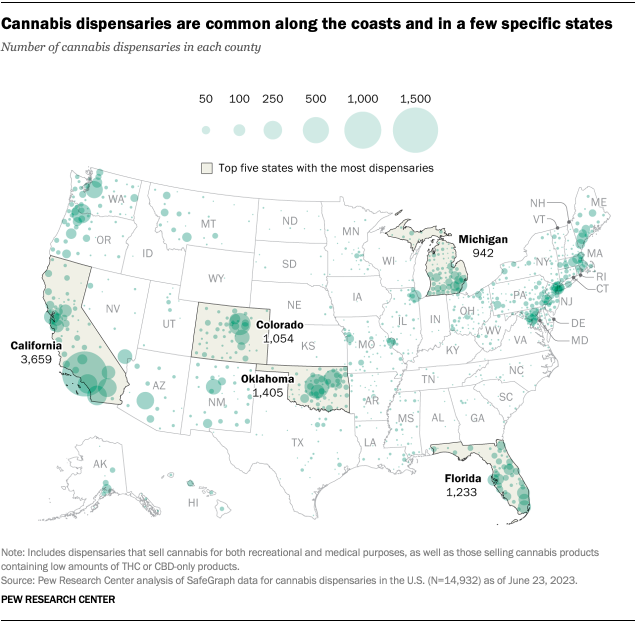
Note: This is an update of a post originally published April 26, 2021, and updated April 13, 2023.

Sign up for our weekly newsletter
Fresh data delivered Saturday mornings
Americans overwhelmingly say marijuana should be legal for medical or recreational use
Religious americans are less likely to endorse legal marijuana for recreational use, four-in-ten u.s. drug arrests in 2018 were for marijuana offenses – mostly possession, two-thirds of americans support marijuana legalization, most popular.
About Pew Research Center Pew Research Center is a nonpartisan fact tank that informs the public about the issues, attitudes and trends shaping the world. It conducts public opinion polling, demographic research, media content analysis and other empirical social science research. Pew Research Center does not take policy positions. It is a subsidiary of The Pew Charitable Trusts .
- Accessibility Options:
- Skip to Content
- Skip to Search
- Skip to footer
- Office of Disability Services
- Request Assistance
- 305-284-2374
- High Contrast
- School of Architecture
- College of Arts and Sciences
- Miami Herbert Business School
- School of Communication
- School of Education and Human Development
- College of Engineering
- School of Law
- Rosenstiel School of Marine, Atmospheric, and Earth Science
- Miller School of Medicine
- Frost School of Music
- School of Nursing and Health Studies
- The Graduate School
- Division of Continuing and International Education
- People Search
- Class Search
- IT Help and Support
- Privacy Statement
- Student Life
University of Miami
- Division of University Communications
- Office of Media Relations
- Miller School of Medicine Communications
- Hurricane Sports
- UM Media Experts
- Emergency Preparedness
Explore Topics
- Latest Headlines
- Arts and Humanities
- People and Community
- All Topics A to Z
Related Links
- Subscribe to Daily Newsletter
- Special Reports
- Social Networks
- Publications
- For the Media
- Find University Experts
- News and Info
- People and Culture
- Benefits and Discounts
- More Life@TheU Topics
- About Life@the U
- Connect and Share
- Contact Life@theU
- Faculty and Staff Events
- Student Events
- TheU Creates (Arts and Culture Events)
- Undergraduate Students: Important Dates and Deadlines
- Submit an Event
- Miami Magazine
- Faculty Affairs
- Student Affairs
- More News Sites
School of Law student researches single-use plastics
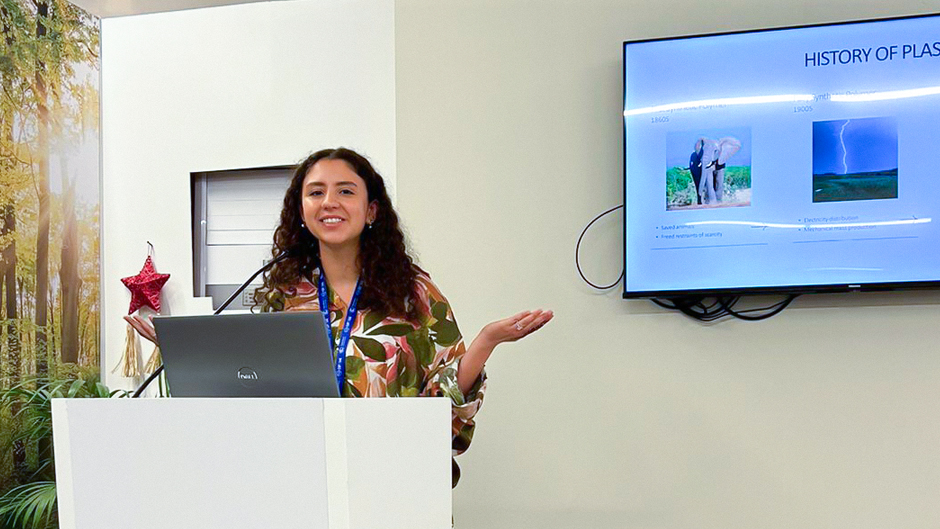
School of Law student Kaitlyn Jauregu presented on single-use plastics at the COP 28 climate summit in the United Arab Emirates in December. Photo: Courtesy of Kaitlyn Jauregui
By Catharine Skipp [email protected] 04-09-2024
Growing up, Kaitlyn Jauregui and her friends loved kayaking on the Oleta River in North Miami Beach near her home. They were appalled by the trash washed up on the shores and bobbing on the river that connects the Everglades with Biscayne Bay. They started bringing bags on their trips to collect water bottles, plastic caps and bags, and other detritus and properly dispose of them.
Fast forward a decade, and Jauregui is in Dubai, United Arab Emirates, this past December attending the United Nations climate summit—the 28th annual Conference of the Parties, known as COP28, with professor Jessica Owley , director of the Environmental Law Program , and her peers from the University of Miami School of Law .
There, the 24-year-old presented her research on single-use plastics in the food and beverage industry and worked with the Ecuadorian delegation, focusing on a long-range goal of forming a treaty to end the practice. Jauregui recently prepared a brief for the Ecuadorian government.
From rivers to beaches to an educational concentration
By the time Jauregui attended the Alonzo and Tracy Mourning Senior High Biscayne Bay Campus in North Miami, her interests had grown, and she enrolled in AP environmental science.
"The course made me very interested in environmental studies, and I considered pursuing environmental law for a while,” she said.
Jauregui was also a part of her high school's law academy, which replaced all participating students' electives with legal-based studies. "I loved the in-class debates and legal theory projects, so from then I knew I would study law," she said. Jauregui gained practical experience through the program by volunteering at the North Dade Justice Center for Justice Jason Dimitris.
However, she had been surrounded by a business mindset her entire life, being around her family's successful luxury bus company, and had always known business would figure somehow into her future career.
After that, she found a great way to combine her business, law, and environmental studies interests. At Emory University in Atlanta, Georgia, Jauregui earned a B.B.A. in marketing and sustainability from the Goizueta Business School, leading her to her first U.N. COP attendance in 2019. She studied "how we in business and law can incorporate greener practices," an interest that continued into law school.
Distilling her many interests, at the School of Law she is an editor of the Business Law Review and has garnered Legal Academy Fellow Honors: CALI Award in Corporate Compliance and Risk Management, Dean's Award in Administrative Law, Congressional Hispanic Leadership Institute Fellowship, and Cuban American Bar Association Scholarship.
Following her graduation in May and admission to The Florida Bar, Jauregui will be junior legal counsel in the general counsel's office of Celsius Holdings Inc., the global energy drink company, where she will enhance company policies regarding international trade, sustainability goals, and intellectual property.
Jauregui hopes to inspire lawyers and businesspersons to be mindful of their influence on stakeholder decision-making about consumption and waste. "I would like to promote the idea of a circular economy in my role at Celsius," she said.

- Coral Gables , FL 33124
- 305-284-2211 305-284-2211
- UM News and Events
- Alumni & Friends
- University Hotline
Tools and Resources
- Academic Calendar
- Parking & Transportation
- social-facebook
- social-twitter
- social-youtube
- social-instagram
Copyright: 2024 University of Miami. All Rights Reserved. Emergency Information Privacy Statement & Legal Notices Title IX & Gender Equity Website Feedback
Individuals with disabilities who experience any technology-based barriers accessing the University’s websites or services can visit the Office of Workplace Equity and Inclusion .
- Election 2024
- Entertainment
- Newsletters
- Photography
- Personal Finance
- AP Investigations
- AP Buyline Personal Finance
- Press Releases
- Israel-Hamas War
- Russia-Ukraine War
- Global elections
- Asia Pacific
- Latin America
- Middle East
- Election Results
- Delegate Tracker
- AP & Elections
- March Madness
- AP Top 25 Poll
- Movie reviews
- Book reviews
- Personal finance
- Financial Markets
- Business Highlights
- Financial wellness
- Artificial Intelligence
- Social Media
Yes, we’re divided. But new AP-NORC poll shows Americans still agree on most core American values
Most U.S. adults share many core values on what it means to be an American despite the country’s deep political polarization according to a new poll from The Associated Press-NORC Center for Public Affairs Research.
FILE - The Capitol is seen as water sprinklers soak the National Mall on a hot summer morning in Washington, July 15, 2022. A new poll finds that most Americans share many core values on what it means to be an American despite the country’s deep political polarization. The poll from The Associated Press-NORC Center for Public Affairs Research found that about 9 in 10 U.S. adults say the right to vote, the right to equal protection under the law and the right to privacy are important or very important to the U.S.’s identity as a nation.(AP Photo/J. Scott Applewhite)
- Copy Link copied
WASHINGTON (AP) — Despite the country’s deep political polarization, most Americans share many core beliefs about what it means to be an American, according to a new poll.
The poll from The Associated Press-NORC Center for Public Affairs Research found that about 9 in 10 U.S. adults say the right to vote, the right to equal protection under the law and the right to privacy are extremely important or very important to the United States’ identity as a nation. The survey also found that 84% feel the same way about the freedom of religion.
The results, which included perspectives on a number of different freedoms and rights, have only small variances between Republicans and Democrats except on the right to bear arms, which Republicans are more likely to see as core to the nation’s identity. The overall findings are striking because they come at a time of extreme partisanship when political agreements seem rare and concerns are heightened over the potential for violence during a volatile presidential election year.
“If you get a bunch of normal people at random and put them in a room together and chat about issues, there’s a lot more convergence than you might imagine,” said Michael Albertus, a political science professor at the University of Chicago.
A more pessimistic assessment of the country was reflected in another finding — that only about 3 in 10 Americans believe the nation’s democracy is functioning well. About half say the U.S. is a poorly functioning democracy, while 14% say the U.S. is not a democracy.
The tension between the broad consensus on the country’s fundamental values and discontent with how well its form of government is working is not a surprise, experts say.
“Part of it is really our leaders are not reflecting the electorate, and they behave in a way that’s much more polarized than what the electorate is,” said Lilliana Mason, a political scientist at Johns Hopkins University.
Most Americans, she said, “are pretty moderate, but they’ve been riled up to hate people of the other party for being different from them culturally, racially and religiously.”
The AP-NORC poll also found broad agreement on the importance of some key values for the U.S.’s identity as a country. About three-quarters of U.S. adults agree that a democratically elected government is extremely or very important, and about 8 in 10 think the same about the ability of people living in the U.S. to get good jobs and achieve the American dream.
But what achieving that dream means — and which values are most fundamental to American culture — isn’t something all Americans agree on.
Democrats are more likely than Republicans — 71% to 38% — to believe that the ability to come to the U.S. from elsewhere in the world to escape violence or find economic opportunities is core to the country’s identity. A majority of Republicans, 58%, think a culture grounded in Christian values and beliefs is an essential characteristic, compared to only 18% of Democrats.
Juan Sierra, 51, a naturalized citizen whose family immigrated from the Dominican Republic after a hurricane destroyed his father’s cement business, said it is very important to him that the U.S. be seen as a place of opportunity.
The Capitol is seen as water sprinklers soak the National Mall on a hot summer morning in Washington, July 15, 2022. (AP Photo/J. Scott Applewhite)
The industrial technician in Port St. Lucie, Florida, said he believes democracy is working and will continue to do so “as long as there are good people in government.”
Sierra also said it was extremely important that people have freedom of religion, although he had concerns over the nation’s identity being tied to Christianity.
“We’re seeing what happens right now when laws are passed and decisions are made based on someone’s religion,” he said, citing the Alabama Supreme Court ruling in February that frozen embryos can be considered children and be afforded legal protections, a decision that temporarily halted IVF procedures in the state.
Susan Johnson, a 76-year-old Republican living in the Dallas suburbs, said the nation’s standing as a beacon to others who need refuge is very important, but said that could not override concerns about border security.
“We need people working,” she said. “We just need them to come the right way.”
Johnson also said she believes it’s extremely important that the nation’s identity be grounded in spirituality.
“Whether or not you’re Mormon or a Muslim or a Christian, they just have to have some higher power to reach up to,” she said. “The country is going to fall apart if we don’t believe in God.”
The poll found few divisions on democracy as a system in theory, but it identified one notable gap: younger Americans between the ages of 18 to 29 were less likely than those 60 and older to say the U.S. is a well-functioning democracy. They’re also less likely than older Americans to believe that some characteristics are essential to the U.S.’s character as a nation, including having a democratically elected government. About 6 in 10 younger adults see this as important, compared to about 9 in 10 older adults.
Palakjot Singh, a 21-year-old college student in Fresno, California, identified himself as a Republican and said he had a better quality of life when Donald Trump was president. He said the U.S. is not a well-functioning democracy in part because people are not open to debating different points of view compared to previous generations.
“There is not good communication,” he said. “Nobody is sitting together trying to get to one point.”
Howard Lavine, a political science professor at the University of Minnesota, said the generational split is understandable. Many younger people don’t remember a time when those with opposing views and from different political backgrounds could get together and “come over to your house.” Their frame of reference is the hyper partisanship of the Trump years, he said.
Joe Lagle, 55, a retired Air Force veteran in Colorado Springs who said he has not voted for either President Joe Biden or Trump, said the nation’s various rights are “all important” but believes they are being eroded by intolerance and well-meaning but shortsighted people.
Mike Maloy, 41, an engineer in Greensboro, North Carolina, said having those rights and freedoms “doesn’t necessarily mean the U.S. is a functioning democracy.”
“Everything is run by a handful of people and their corporations,” he said. “That’s not a democracy.”
A Democrat, Maloy cited as an example this year’s presidential primary in North Carolina, when Biden was the lone candidate on the ballot. He called that “frustrating” and said the result was that voters “had no choice.”
The poll of 1,282 adults was conducted March 21-25, 2024, using a sample drawn from NORC’s probability-based AmeriSpeak Panel, which is designed to be representative of the U.S. population. The margin of sampling error for all respondents is plus or minus 3.8 percentage points.
Associated Press polling writer Linley Sanders contributed to this report.
The Associated Press receives support from several private foundations to enhance its explanatory coverage of elections and democracy. See more about AP’s democracy initiative here . The AP is solely responsible for all content.

IMAGES
VIDEO
COMMENTS
The only platform for focused, rigorous analysis of global developments in media law, this peer-reviewed journal, launched in Summer 2009, is: essential for teaching and research, essential for practice, essential for policy-making. It turns the spotlight on all those aspects of law which impinge on and shape modern media practices - from ...
Explore the latest full-text research PDFs, articles, conference papers, preprints and more on MEDIA LAW. Find methods information, sources, references or conduct a literature review on MEDIA LAW.
80 Media law Research Topics. In the ever-evolving landscape of modern media, the intersection of law and communication has become a dynamic field ripe for exploration and scholarship. For undergraduate, master's, and doctoral students alike, embarking on a research journey into media law topics offers an exciting opportunity to delve deep ...
PDF | On Jan 1, 2017, Tendai Chari published Rethinking Media Law and Ethics in the Digital Age: Issues, Challenges and Controversies | Find, read and cite all the research you need on ResearchGate
The DMLP carries out its mission through five core initiatives: (1) its detailed Legal Guide on media and business law topics for non-lawyers; (2) its searchable Database of Legal Threats directed at online publishers; (3) its nationwide attorney referral service, the Online Media Legal Network; (4) its Research & Response initiative to address ...
Top contributors. David Rolph Professor of Law, University of Sydney Mark Pearson Professor of Journalism and Social Media, Griffith Centre for Social and Cultural Research, Griffith University ...
Legal Frontiers in Digital Media 2024. The Media Law Resource Center and the Berkeley Center for Law & Technology are proud to present the next in this series of conferences that explore emerging legal issues surrounding digital content in today's multi-platform world. New York Times v. Sullivan: The Case for Preserving an Essential Precedent.
The merger of TVNZ and RNZ needs to build trust in public media - 3 things the law change must get right. Major public media reform in New Zealand is coming at the same time as trust in ...
Explore the latest full-text research PDFs, articles, conference papers, preprints and more on MEDIA LAW. Find methods information, sources, references or conduct a literature review on MEDIA LAW
The SAGE Guide to Key Issues in Mass Media Ethics and Law is an authoritative and rigorous two-volume, issues-based reference set that surveys varied views on many of the most contentious issues involving mass media ethics and the law.Divided into six thematic sections covering information from contrasting ethical responsibly and legal rights for both speech and press, newsgathering and access ...
In April 2012, the School of Law began publishing the Journal of Media Law & Ethics (ISSN1940-9389), an online, peer-reviewed journal exploring current legal issues facing the media including copyright, defamation and reporters' privilege. Published quarterly, JMLE seeks theoretical and analytical manuscripts that advance the understanding of ...
Media Law is a fast developing and increasingly high profile area of law. It is an area that allows scholars to look at advanced issues relating to freedom of expression and the right to communicate, and the way these rights intersect with competing interests. The course covers a number of key themes in Media Law and will begin by looking at the justifications for and meanings of media freedom.
topic to appear in the journal. By publishing some of the most recent work on issues in law and the media, we hope to draw the attention of psycholegal scholars to questions in this fertile research area that deserve theoretical and empirical study. Law and the media have become inescapably intertwined. Because a rela-
Covers: 1965-. Offers full text for law journals, centered on the discipline of law and legal topics such as criminal justice, international law, federal law, organized crime, medical, labor & human resource law, ethics, the environment and much more. Covers: varies; most newspapers are 1990s-; legal materials extend back to the 19th century.
Abstract. Despite the ongoing debate about the role the media play in democracies, there is little empirical research on its role in lawmaking. Yet studies conducted at the micro-level can provide insight into the influence journalists exert on this fundamental aspect of politics. This case study analyzes the role of media attention in the ...
Abstract. Although occasional articles on law and the media have been published in Law and Human Behavior, this special issue is the first collection of articles on the topic to appear in the journal.By publishing some of the most recent work on issues in law and the media, we hope to draw the attention of psycholegal scholars to questions in this fertile research area that deserve theoretical ...
The main aspects of communication. The triggering topics. What do you need to start an instant "holywar" in media? The phenomenon of hype and its usage of the media. Single bloggers versus media companies. Communication and media psychology. The history of advertising and its important in the modern business. The popular culture in the media.
Constitutional Law Research Paper Topics: The impact of the First Amendment on freedom of speech in the digital age. Analyzing the constitutionality of affirmative action policies in higher education. The role of the Supreme Court in shaping the interpretation of the Second Amendment.
but also for the general public to have a basic knowledge of media law and ethics, in order to act responsibly and ethically when disseminating content to a mass audience. VII. Role Of Mass Media In A Democratic Society ... Mass Media Laws and Regulations in India, Bahri Sons (India Research Press), Delhi [4]. Prasad Kiran (2011), Media Laws in ...
Law Research Paper Topic Selection Tips. If you want to write a law research paper, then a good law research topic is what you need. Basically, the law is a complex subject, and hence choosing the right research topic from them is challenging. While selecting the legal research topic, be sure to keep the following tips in mind.
Here are our best and most controversial media topics: Exercising the First Amendment in media in the US. Promoting gun violence in mass media. Mass media effects on terrorism. Digital media is destroying traditional media. Artificial intelligence in mass media. Media effects on the death penalty in China.
Social media has radically changed the way people receive and share information or opinions about one another. Unfounded statements on the Internet can enter the mainstream in a viral moment, as seen in a recent series of high-profile cases that use defamation law to fight online misinformation and untruths.
The Court held that a public official's social media activity is state action under 42 U.S.C. §1983 only if the official meets both of these two requirements: The official had the government's actual speaking authority on the specific social media topic involved. Whether an official has this actual government speaking authority is fact ...
Our team has meticulously prepared a list of 50 top contemporary topics for research in August 2022 across a number of legal subjects . Happy Researching! Military law. 1. Military Law v. Martial Law: A Comparative Study. 2. Authorities under Military Law in India. 3.
This analysis draws from several Pew Research Center reports on Americans' use of and attitudes about social media, based on surveys conducted in 2023. For more information, read: Americans' Social Media Use; How U.S. Adults Use TikTok; Social Media and News Fact Sheet; Teens, Social Media and Technology 2023
Research Topics . All Publications ... Income tax law alone accounts for over half of those pages (2,544). ... It conducts public opinion polling, demographic research, media content analysis and other empirical social science research. Pew Research Center does not take policy positions. It is a subsidiary of The Pew Charitable Trusts.
Around nine-in-ten Americans say marijuana should be legal for medical or recreational use, according to a January 2024 Pew Research Center survey.An overwhelming majority of U.S. adults (88%) say either that marijuana should be legal for medical use only (32%) or that it should be legal for medical and recreational use (57%).Just 11% say the drug should not be legal in any form.
At Emory University in Atlanta, Georgia, Jauregui earned a B.B.A. in marketing and sustainability from the Goizueta Business School, leading her to her first U.N. COP attendance in 2019. She studied "how we in business and law can incorporate greener practices," an interest that continued into law school.
The poll from The Associated Press-NORC Center for Public Affairs Research found that about 9 in 10 U.S. adults say the right to vote, the right to equal protection under the law and the right to privacy are extremely important or very important to the United States' identity as a nation. The survey also found that 84% feel the same way about ...